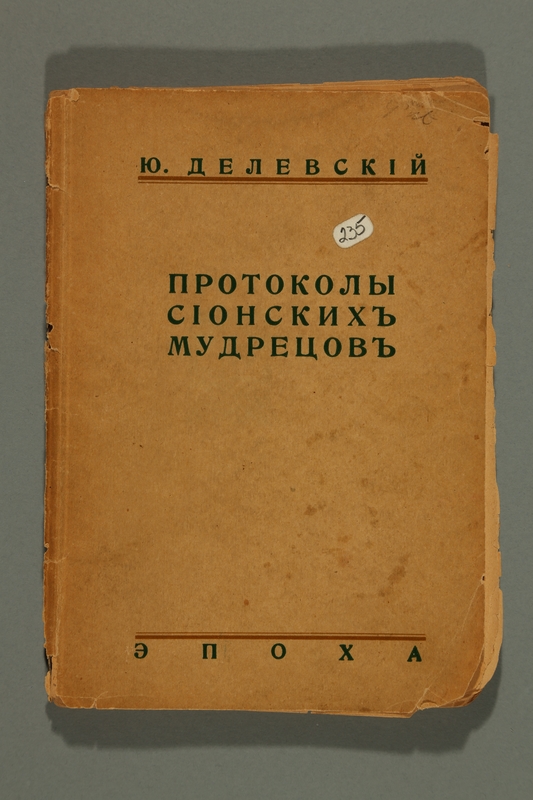Overview
- Brief Narrative
- Book written by Jacques Delevsky and published in Berlin, Germany, in 1923, which discredits the antisemitic publication, “The Protocols of the Elders of Zion”. Delevsky was the pseudonym used by Yakov Lazarevich Yudelevsky, a Russian Jewish émigré to France, who wrote one of the first Russian-language books identifying the “Protocols” as a forgery. He was a writer, scholar, and socialist-revolutionary, who became a leader in his political movement after emigrating from Russia. The “Protocols”, originally written in Russian in the late 1800s, is a fabricated, antisemitic text that has been translated into dozens of languages. The work supposedly documents the secret meetings between Jewish leaders conspiring to dominate the world and helped popularize the antisemitic myth that Jews use their power and influence to manipulate and control world governments. These meetings, their alleged leaders, and the conspiracy described never existed. The “Protocols” were first exposed as a fraud in England in 1920, by Lucien Wolf, and then described as “clumsy plagiarism” by the London Times in 1921, which confirmed that it had been heavily copied from Maurice Joly's 1864 satire, “Dialogue in Hell Between Machiavelli and Montesquieu”. Despite more than 100 years of repeated proof that the “Protocols” is a forgery, the widespread and continued publication of the text in various forms has helped popularize the antisemitic myth that Jews use their power and influence to manipulate and control world governments. This myth has become one of the most prevalent and long-lasting antisemitic conspiracy theories the world over. This book is one of more than 900 items in the Katz Ehrenthal Collection of antisemitic visual materials.
- Title
- Protokoly Sionskikh" Mudretsov"
- Subtitle
- Istoriya odnogo podloga
- Alternate Title
- Protocols of the Elders of Zion: (The Story of One Forgery)
- Date
-
publication:
1923
- Geography
-
publication:
Berlin (Germany)
- Credit Line
- United States Holocaust Memorial Museum Collection, Gift of the Katz Family
- Contributor
-
Compiler:
Peter Ehrenthal
Author: Jacques Delevsky
Subject: Jacques Delevsky
Publisher: Epocka
- Biography
-
The Katz Ehrenthal Collection is a collection of more than 900 objects depicting Jews and antisemitic and anti-Jewish propaganda from the medieval to the modern era, in Europe, Russia, and the United States. The collection was amassed by Peter Ehrenthal, a Romanian Holocaust survivor, to document the pervasive history of anti-Jewish hatred in Western art, politics and popular culture. It includes crude folk art as well as pieces created by Europe's finest craftsmen, prints and periodical illustrations, posters, paintings, decorative art, and toys and everyday household items decorated with depictions of stereotypical Jewish figures.
Yakov Lazarevich Yudelevsky (later Jacques Delevsky, 1868-1957) was born in Pruz︠h︡any, Russia (now Pruz︠h︡any, Belarus), to Lazer (Louis) Yudelevsky and his wife. Yakov may have been educated at the Faculty of Physics and Mathematics of Saint Petersburg University and possibly received training as an engineer. Yakov later married, and the couple had at least one child.
Yakov came to be known by his pseudonym, Jacques Delevsky, and was a prominent writer, historian, and member of the anti-tsarist movement in Russia. Delevsky was imprisoned for his political and revolutionary activities, and was later exiled to northeastern Siberia for five years. During this time, he found work as a teacher. After his exile ended, Delevsky immigrated to France and settled in Paris. He likely returned to school and graduated from the Mathematics Faculty of the Sorbonne. Delevsky maintained a strong interest in the social and political activities of Russia and was a well-known member of the Russian-Jewish intelligentsia and the Russian Socialist Revolutionary Party. The 1917 Russian Revolution led to the Bolshevik-led overthrow of the imperial government and a lot of military and political chaos. These changes prompted Delevsky to reconsider some of his earlier, revolutionary views and eventually oppose the Bolshevik regime.
Throughout the late 1800s and early 1900s, Delevsky wrote more than 20 works in multiple languages. Among these was Delevsky’s 1923 book identifying “The Protocols of the Elders of Zion” as a forgery. His was one of the first Russian-language books to do so, though many other Europeans were writing to discredit the “Protocols” at the same time. The “Protocols”, originally written in Russian in the late 1800s, is a fabricated, antisemitic text that supposedly documents the secret meetings between Jewish leaders conspiring to dominate the world. The widespread publication of the work helped popularize the antisemitic myth that Jews use their power and influence to manipulate and control world governments. This canard became a key component in Nazi ideology as it took root in Germany during the 1930s. Delevsky was committed to fighting antisemitism, and following the 1927 founding of the International League Against Antisemitism, he became a member. As a critic of antisemitic propaganda, a member of the Jewish intelligentsia, and a political leader Delevsky would have been very aware of the worsening conditions for Jews within Germany and the lands that it occupied during this time.
During the late 1930s or early 1940s, Delevsky’s wife passed away. He immigrated to the United States at the beginning of World War II (1939-1945). Delevsky eventually settled in New York City, New York, and corresponded with scholars at a range of US universities while looking to find a potential teaching position or related job within academia. He also applied for support from the Emergency Committee in Aid of Displaced Foreign Scholars between 1941 and 1944. He petitioned for US naturalization in August 1949, at which time he legally changed his name to Jacques Delevsky, a variation that he had been using for many decades. By 1950, Delevsky was working as a teacher at a private school and living in the Bronx.
Physical Details
- Classification
-
Books and Published Materials
- Category
-
Books and pamphlets
- Object Type
-
Books (lcsh)
- Genre/Form
- Books.
- Physical Description
- Book; 158 p. ; 19cm.
Bound book with a thick, paper cover and Russian text printed in black ink on discolored, tan pages. The cover and spine are partially detached and bear the title, author, and publication information in dark green, Cyrillic font. Many of the interior pages are loose or detached, and the edges are worn and ragged with many losses. - Dimensions
- overall: Height: 7.500 inches (19.05 cm) | Width: 5.500 inches (13.97 cm) | Depth: 0.500 inches (1.27 cm)
- Materials
- overall : paper, ink, thread, adhesive, pencil
- Inscription
- front cover, sticker, handwritten, pencil : 235
title page, bottom center, stamped, black ink : Printed in Germany
Rights & Restrictions
- Conditions on Access
- No restrictions on access
- Conditions on Use
- No restrictions on use
Keywords & Subjects
Administrative Notes
- Legal Status
- Permanent Collection
- Provenance
- The publication was donated to the United States Holocaust Memorial Museum in 2016 by the Katz family.
- Funding Note
- The cataloging of this artifact has been supported by a grant from the Conference on Jewish Material Claims Against Germany.
- Special Collection
-
Katz Ehrenthal Collection
- Record last modified:
- 2023-06-26 07:46:54
- This page:
- https://collections.ushmm.org/search/catalog/irn545164
Also in Katz Ehrenthal collection
The Katz Ehrenthal Collection is a collection of over 900 objects depicting Jews and antisemitic and anti-Jewish propaganda from the medieval to the modern era, in Europe, Russia, and the United States. The collection was amassed by Peter Ehrenthal, a Romanian Holocaust survivor, to document the pervasive history of anti-Jewish hatred in Western art, politics and popular culture. It includes crude folk art as well as pieces created by Europe's finest craftsmen, prints and periodical illustrations, posters, paintings, decorative art, toys and everyday household items decorated with depictions of stereotypical Jewish figures.
Date: approximately 1600-approximately 1950

Wooden marionette dressed as a Jewish banker
Object
19th century German marionette dressed as an Orthodox Jewish banker in a somewhat shabby black suit. The carved, painted face has a large, curved nose and peyots (sidecurls), but these Jewish features are not overly exaggerated. Marionette shows were a popular form of entertainment in the 19th century for adults as well as children. Germany was now the banking center of Europe, after the chaos of the French revolution and Napoleonic wars, and the house of Rothschild had emerged in Frankfurt. Jews were still linked to the stereotypical evils of money lending, and while the banker was a more respectable figure, Jews were now also viewed with jealousy and suspicion as the creators of capitalism and its evils. This marionette is one of more than 900 items in the Katz Ehrenthal Collection of antisemitic visual materials.
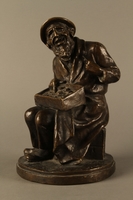
Bronze figurine of a seated Jewish peddler
Object
Metal figurine of a sitting Jewish peddler with a box of goods on his lap, from the 19th century. The man has several stereotypical physical features commonly attributed to Jewish men: a large nose, hooded eyes, full and thick lips, sidelocks, and a beard. Peddlers were itinerant vendors who traveled the countryside and sold goods to the public. They usually traveled alone and carried their goods with them as they went. Peddling was a common occupation for young Jewish men during the 18th and 19th centuries. Most peddlers hoped their hard work would serve as a springboard to more lucrative and comfortable occupations. However, old prejudices formed an antisemitic stereotype of the Jewish peddler. The stereotype originated from the economic and professional restrictions placed on early European Jews. They were barred from owning land, farming, joining trade guilds, and military service. These restrictions limited Jews to the occupations of retail peddling, hawking, and money lending. Additionally, medieval religious belief held that charging interest (known as usury) was sinful, and the Jews who occupied these professions were looked down upon predominantly by European Christians. They were perceived as morally deficient and willing to engage in unethical business practices. The inability of Jews to legally hold other occupations, combined with Christians’ disdain for the professions Jews were allowed to practice, helped form the canard of the greedy Jew who exploited Gentiles. This canard was often visually depicted as a Jewish peddler, an untrustworthy figure that sold cut-rate items at inflated prices. Often, they were shown carrying a sack on their back or a tray around their midsection. This figurine is one of the more than 900 items in the Katz Ehrenthal Collection of antisemitic artifacts and visual materials.
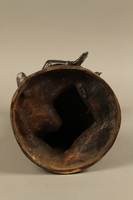
Bronze figurine of a Jewish man holding a rooster
Object
Detailed bronze figure of an Orthodox Jewish man holding a rooster upside down by its feet, possibly created by Carl Kauba (1865-1922). The man has a long pointed nose, side curls, and a curly beard, all stereotypical physical features commonly attributed to Jewish men. The man may be performing the ceremony of Kaparot, a custom practiced by some Orthodox Jews the day before Yom Kippur. Kaparot consists of circling a chicken over one’s head nine times while reciting the appropriate text from the Bible. The purpose of the ceremony is to transfer the sins of a person to a fowl, so that it will take on any misfortune that might otherwise occur to the person. The bird is then slaughtered according to the laws of kashrut, and donated to the less fortunate or sold, on the condition that the proceeds are donated. Traditionally, roosters are used for men, and hens for women. Alternatively, money can be substituted for the bird. The figurine’s likely creator, Carl Kauba, was known for producing Viennese bronzes with polychrome finish, intricate detail, and the realistic forms, around the turn of the 20th century. His most well-known bronzes depict figures from the American West, many of which were sold in the United States. This figurine is one of the more than 900 items in the Katz Ehrenthal Collection of antisemitic artifacts and visual materials.
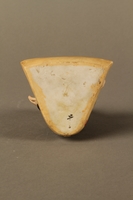
Ceramic change holder in the shape of an Orthodox Jewish man
Object
Late 19th or early 20th century ceramic change holder in the shape of an Orthodox Jewish man standing on top of a shallow dish labelled, “The Old Pal.” The figurine was produced by the Schafer and Vater Porcelain Factory in Volkstedt Rudolstadt, Thuringia, Germany. The company was established in 1890, and by 1910, their goods were distributed in the United States by Sears Roebuck Company. The man has very long, bushy sidelocks, a stereotypical physical feature commonly attributed to Jewish men. The man’s black clothing and the kippah conform to the Jewish concept of tzniyus (modest dress and behavior), which Orthodox Jews adhere to for religious reasons. Orthodox Judaism is the most traditional and stringent of the three main branches of modern Judaism. Orthodox Jews believe the Torah is of divine origin and strive to adhere to the 613 commandments of Jewish Law. The long, black suit-style jacket is either a “rekel” or a “bekishe.” The resemblance of the man’s eyes and nose to gold coins and his presence on the coin dish, are likely references to the antisemitic stereotype of the greedy Jew who exploits gentiles for their own economic advantage. This stereotype originated from the economic and professional restrictions placed on early European Jews. They were barred from owning land, farming, joining trade guilds, and military service. These restrictions forced many Jews into occupations such as money changing or money lending. Additionally, medieval religious belief held that charging interest (known as usury) was sinful, and the Jews who occupied these professions were looked down upon predominantly by Medieval Christians. They were perceived as morally deficient, greedy, and willing to engage in unethical business practices. This change holder is one of more than 900 items in the Katz Ehrenthal Collection of antisemitic artifacts and visual materials.
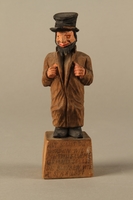
Wooden folk art figurine of a Jewish freeloader
Object
Small, roughly carved, 19th-century wooden figurine of a Jewish schnorrer, a Judeo-German term for a Jewish beggar. A phrase on the figurine’s base may represent the sort of a line a schnorrer could use on a hesitant potential benefactor. Methuselah is a biblical figure renowned for his old age, and Strauss is likely a reference to a rich Jewish family of department store owners and bankers. By referencing those two names, the schnorrer may be implying that their mark is old and wealthy, and would not need or miss any money that the mark contributed to him. During the Chmielnicki pogroms in Poland (1648-57), hundreds of Jewish communities were destroyed and thousands of Jews fled west after the destruction of their homes and way of life. Afterward, the influx of destitute Jewish refugees in central Europe helped create the archetype of the Jewish beggar, or schnorrer. Unlike a beggar or panhandler who could be distinguished by their ragged outward appearance, a stereotypical schnorrer dressed respectably. Schnorrers were characterized as impudent, with an air of entitlement to disguise their true needs from charitable individuals. They were evasive about why they needed assistance, and were not satisfied with small favors. Typical reasons given for a schnorrer’s collection included recovering from the destruction of their home, or funding the dowry for their daughter or another relative. Schnorrers were said to invert the act of charity by asking for handouts. They give the affluent members of society a chance to do a good deed, which complies with the Jewish communal practice of providing aid to those less well off in the community. This act of kindness meant the charitable patron should be thankful to the schnorrer for providing the opportunity. This folk art figurine is one of the 900 items in the Katz Ehrenthal Collection of antisemitic artifacts and visual materials.

Caricature of a Jewish man in a top hat with exaggerated facial features
Object
Small, color print with a crudely exaggerated caricature of a Jewish schnorrer. The print may be a trade card, an illustrated advertising card distributed by businesses to promote their goods or services. The cards often featured colorful and vivid images designed to attract consumer’s attention. However, some images played on popular prejudices and stereotypes of Native Americans, Near and Far Eastern cultures, and Jewish minorities. A widely held antisemitic stereotype of the time was the schnorrer, a Judeo-German term for a Jewish beggar. During the Chmielnicki pogroms in Poland (1648-57), hundreds of Jewish communities were destroyed and thousands of Jews fled west after the destruction of their homes and way of life. Afterward, the influx of destitute Jewish refugees in central Europe helped create the archetype of the Jewish beggar, or schnorrer. Unlike a beggar or panhandler who could be distinguished by their ragged outward appearance, a stereotypical schnorrer dressed respectably. Schnorrers were characterized as impudent, with an air of entitlement to disguise their true needs from charitable individuals. They were evasive about why they needed assistance, and were not satisfied with small favors. Typical reasons given for a schnorrer’s collection included recovering from the destruction of their home, or funding the dowry for their daughter or another relative. Schnorrers were said to invert the act of charity by asking for handouts. They give the affluent members of society a chance to do a good deed, which complies with the Jewish communal practice of providing aid to those less well off in the community. This act of kindness meant the charitable patron should be thankful to the schnorrer for providing the opportunity. This print is one of the 900 items in the Katz Ehrenthal Collection of antisemitic artifacts and visual materials.
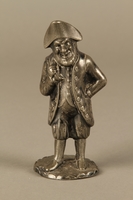
Pewter pepper shaker as a bearded Jewish peddler in tricorn hat
Object
Pewter pepper pot in the shape of a Jewish man in the tricorn hat, knee length jacket, and breeches fashionable circa 1775, known as colonial style. He has stereotypical Jewish features, such as a very large nose, but the fine, detailed metalwork make it a naturalistic portrait. The character and subject resemble depictions found in popular prints produced at the same time, known as Cries of London. These were picturesque scenes of city life that featured street characters, such as Jewish peddlers, as workers who provided useful services and vibrancy to urban areas. This pepper pot is one of the 900 items in the Katz Ehrenthal Collection of antisemitic artifacts and visual materials.

Drinking glass with caricature a Jew on his hobby-horse, Old Clothes
Object
Small drinking glass with a painted caricature of a Jewish man riding a draisienne (also known as a hobby-horse, and derogatively called a dandy horse), comprised of a sack on wheels. The original image is attributed to the satirical English printmaker, William Heath, and dates to 1819. This image has been reproduced in print form, and has been used to decorate other objects, such as glasses and plates. The draisienne was a precursor to, and has a similar design as the bicycle, but without pedals or gears for propulsion. A rider pushed themselves along with their feet, and coasted once at speed. After its invention, the draisienne was featured in many caricatures of the time that mocked aspects of society. In the image, the frame of the draisienne is replaced by a sack labeled, “Old Clothes,” and the caption reads “The Jews [sic] Hobby.” This references Jewish clothes peddlers, itinerant vendors who bought and sold used clothes, often carrying them in heavy sacks. The image and caption imply that clothes peddling was a choice or hobby of Jews, when the opposite is true. European Jews were barred from owning land, farming, joining trade guilds, and military service. These restrictions limited Jews to the occupations of retail peddling, hawking, and moneylending. Due to limited options, peddling was a common occupation for young Jewish men during the 18th and 19th centuries. Most peddlers hoped their hard work would serve as a springboard to more lucrative and comfortable occupations. This drinking glass is one of 900 items in the Katz Ehrenthal Collection of antisemitic artifacts and visual materials.
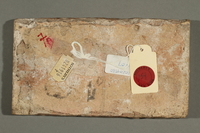
Faience tile with an image of a Jewish peddler with a large box on his back
Object
French faience tile with a colorful image of a stereotypical Jewish peddler created in the 18th century. Faience is earthenware that is coated with a tin-glaze, which gives it a milky, opaque white color. This technique was popular in France from the late 16th century through the 18th century. French manufacturers produced tea sets, tiles, plates, and tureens decorated with elaborate designs and artistic images. The peddler in the image has a large nose and a long beard, two stereotypical Jewish features. Peddling was a common occupation for young Jewish men during the 18th and 19th centuries. However, old prejudices originating from the economic and professional restrictions placed on early European Jews formed an antisemitic stereotype of the Jewish peddler. They were barred from owning land, farming, joining trade guilds, and military service. These restrictions limited Jews to the occupations of retail peddling, hawking, and money lending. Additionally, medieval religious belief held that charging interest (known as usury) was sinful, and the Jews who occupied these professions were looked down upon predominantly by European Christians. They were perceived as morally deficient and willing to engage in unethical business practices. The inability of Jews to legally hold other occupations, combined with Christians’ disdain for the professions Jews were allowed to practice, helped form the canard of the greedy Jew who exploited Gentiles. This canard was often visually depicted as a Jewish peddler, an untrustworthy figure that sold cut-rate items at inflated prices. Often, they were shown carrying a sack on their back or a tray around their midsection. This tile is one of the 900 items in the Katz Ehrenthal Collection of antisemitic artifacts and visual materials.
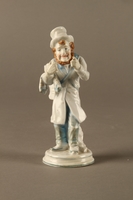
White porcelain match holder depicting a stereotypical Jewish peddler
Object
Decorative porcelain match holder shaped as a Jewish peddler carrying a large, empty sack on his back. The man has several stereotypical physical features commonly attributed to Jewish men: a large nose, fleshy lips, and red hair. Peddlers were itinerant vendors who sold goods to the public. Peddling was a common occupation for young Jewish men during the 18th and 19th centuries. However, old prejudices stemming from the economic and professional restrictions placed on early European Jews formed an antisemitic stereotype of the Jewish peddler. These restrictions limited Jews to the occupations of retail peddling, hawking, and moneylending. Additionally, medieval religious belief held that charging interest (known as usury) was sinful, and the Jews who occupied these professions were looked down upon, predominantly by European Christians. They were perceived as morally deficient and willing to engage in unethical business practices. The inability of Jews to legally hold other occupations, combined with Christians’ disdain for the professions Jews were allowed to practice, helped form the canard of the greedy Jew who exploited Gentiles. This canard was often visually depicted as a Jewish peddler, an untrustworthy figure that sold cut-rate items at inflated prices. The depiction of wicked Jewish characters as redheads also has a long history. Some interpretations of the Bible describe Esau and David (King of Israel), as having red hair, and for many, red hair became a Jewish identifier, even though Jews are no more likely to have red hair than other groups. In medieval Europe, redheads were regarded as untrustworthy, and the Jewish literary villains Fagin and Shylock had red hair. This figurine is one of the 900 items in the Katz Ehrenthal Collection of antisemitic artifacts and visual materials.

White porcelain figurine of a Jewish money changer in a gold dotted vest
Object
Rockingham porcelain figurine of a Jewish money changer made in approximately 1820. He has a large nose and a long beard, both of which are stereotypical physical features commonly attributed to Jewish men. The Rockingham Works pottery factory was located in Swinton, England, on the estate of the Marquess of Rockingham. The factory produced a range of earthenware, stoneware, and porcelain pieces including tableware, figurines, and other decorative pieces. Money changers exchanged foreign coins or currency for those used locally. Many antisemitic depictions of Jews show them hoarding, counting, or handling money. These stereotypes originated from the economic and professional restrictions placed on early European Jews. They were barred from owning land, farming, joining trade guilds, and military service. These restrictions forced many Jews into occupations such as money changing or money lending. Additionally, medieval religious belief held that charging interest (known as usury) was sinful, and the Jews who occupied these professions were looked down upon, predominantly by European Christians. They were perceived as morally deficient, greedy, and willing to engage in unethical business practices. Jews’ inability to legally hold other occupations, combined with Christians’ disdain for the professions Jews were allowed to practice, helped form the canard of the greedy Jew who exploited Gentiles. This canard was often visually depicted as a Jewish man expressing an exaggerated desire for, or counting money. This figurine is one of the 900 items in the Katz Ehrenthal Collection of antisemitic artifacts and visual materials.

Staffordshire loving cup printed with Lord Gordon's circumcision
Object
Staffordshire creamware double handed cup with 2 transfer painted scenes: one of sailors and a drinking song, Can of Grog, by Charles Didbin. The other image, Lord George Riot made a Jew, depicts the circumcision of Lord George Gordon (1751-1793), a British politician who converted to Judaism and was circumcised in 1787, taking the name Israel Ben Abraham. The title refers to the Gordon Riots of 1780, which began with an anti-Catholic demonstration organized by Gordon to protest the Catholic Relief Act. A crowd of 60,000 gathered and anti-Catholic riots broke out in London for several days. In 1788, Gordon was jailed for libel. He continued observing Jewish rituals, and died in Newgate Prison in 1793. This loving cup is one of the more than 900 items in the Katz Ehrenthal Collection of antisemitic artifacts and visual materials.
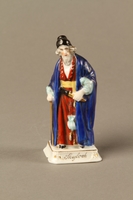
Porcelain figure of Shylock, richly dressed and carrying a dagger
Object
Colorful, 19th century, English porcelain figurine of Shylock, the antagonist from Shakespeare's play, The Merchant of Venice. He has a large nose, side curls, and a long beard; all stereotypical physical features attributed to Jewish men. Jews were expelled from England in 1290, making it unlikely that Shakespeare ever met a Jewish person, and he likely based Shylock on long-standing antisemitic stereotypes. In the play, Shylock is a Jewish moneylender who demands a pound of flesh as recompense from a merchant who failed to repay a loan. Although some scenes make him a sympathetic character, and show how society and his Christian enemies cruelly mistreat him, in the end, he is punished and forced to convert to Christianity. The play was extremely popular in Nazi Germany, with fifty productions between 1933 and 1939. The Ministry of Propaganda created edited versions of the play that removed scenes and lines that evoked sympathy for Shylock or Jews. The Nazis used Shylock to promote Jewish inferiority by making him emblematic of the Jewish race’s perceived wickedness. These versions ignored the ambiguity Shylock was originally infused with, and portrayed him as an avaricious and vengeful character that was grotesque and inhuman. Despite the stereotypical and anti-Jewish elements, the play remains popular and continues to spark debates over whether it should be considered antisemitic. This figurine is one of more than 900 items in the Katz Ehrenthal Collection of antisemitic artifacts and visual materials.
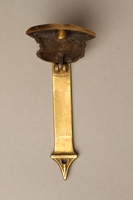
Brass door knocker with the head of an evil looking Shylock
Object
Brass door knocker with the head of Shylock from Shakespeare's Merchant of Venice. Shylock is a Jewish moneylender who demands that his contract for a pound of flesh, owed by a youth for not repaying a loan, be paid in full. First published in 1600 in England, Shylock's characteristics are based upon long standing stereotypes, still popular in a country where Jews had been expelled for 300 years. At times, the portrayal is sympathetic, and we are shown how society and his Christian enemies cruelly mistreat him, but at the end, Shylock is punished for his greed and forced to convert. The play was extremely popular in Nazi Germany, with fifty productions from 1933-1945. Despite the stereotypical anti-Jewish elements, the play continues to spark debate over whether it is antisemitic. This door knocker is one of more than 900 items in the Katz Ehrenthal Collection of antisemitic artifacts and visual materials.

Hand painted vase with a scene of Portia and Shylock in the courtroom
Object
Porcelain vase from the late 19th or early 20th century with an image of the courtroom scene from Shakespeare's play, The Merchant of Venice. The vase was manufactured by the Porzellanfabrik Victoria Schmidt & Co (now part of Thun Karlovarský Porcelán) in Carlsbad, Austria-Hungary (now, Karlovy Vary, Czech Republic), and features a reproduction of an illustration by the English artist, Walter Paget. The image was commonly used on tableware and decorative ceramics. In the scene, Shylock has a long beard and is wearing a skullcap, both stereotypical features attributed to Jewish men. Jews were expelled from England in 1290, making it unlikely that Shakespeare ever met a Jewish person, and he likely based Shylock on longstanding antisemitic stereotypes. In the play, Shylock is a Jewish moneylender who demands a pound of flesh as recompense from a merchant who failed to repay a loan. Although some scenes make him a sympathetic character, and show how society and his Christian enemies cruelly mistreat him, in the end, he is punished and forced to convert to Christianity. The play was extremely popular in Nazi Germany, with fifty productions between 1933 and 1939. The Ministry of Propaganda created edited versions of the play that removed scenes and lines that evoked sympathy for Shylock or Jews. The Nazis used Shylock to promote Jewish inferiority by making him emblematic of the Jewish race’s perceived wickedness. These versions ignored the ambiguity Shylock was originally infused with, and portrayed him as an avaricious and vengeful character that was grotesque and inhuman. Despite the stereotypical and anti-Jewish elements, the play remains popular and continues to spark debates over whether it should be considered antisemitic. This vase is one of more than 900 items in the Katz Ehrenthal Collection of antisemitic artifacts and visual materials.
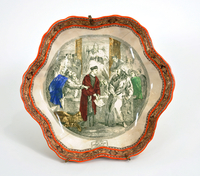
Adams scalloped soup bowl with Portia in court with Shylock
Object
William Adams and Sons soup bowl with a scalloped rim with a colorful illustration of Portia and Shylock in the courtroom scene from Shakespeare's The Merchant of Venice. Shylock is a Jewish moneylender who demands that his contract for a pound of flesh, owed him by a youth who failed to repay a loan, be paid in full. First published in 1600 in England, Shylock's characteristics are based upon long standing, stereotypes, still popular in a country where Jews had been expelled 300 years, since 1290. Although some scenes make him sympathetic, and show how society and his Christian enemies cruelly mistreat him, he is punished and forced to convert. The play was extremely popular in Nazi Germany, with fifty productions from 1933-1945. Despite the stereotypical and anti-Jewish elements, the play continues to spark debates over whether it must be considered antisemitic. This bowl is one of more than 900 items in the Katz Ehrenthal Collection of antisemitic artifacts and visual materials.
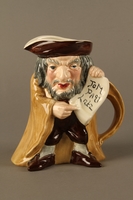
Toby Jug of Shylock holding his contract
Object
Toby jug depicting Shylock from Shakespeare's play, The Merchant of Venice. It was manufactured by the English pottery company, SylvaC, which was in operation from 1894 until 1982. Toby jugs were first made in the mid-18th century and are ceramic pitchers modeled on full-bodied representations of popular characters. Shylock has a large nose, fleshy lips, thick eyebrows, hooded eyes, and a beard; all stereotypical physical features attributed to Jewish men. Jews were expelled from England in 1290, making it unlikely that Shakespeare ever met a Jewish person, and he likely based Shylock on long standing antisemitic stereotypes. In the play, Shylock is a Jewish moneylender who demands a pound of flesh as recompense from a merchant who failed to repay a loan. Although some scenes make him a sympathetic character, and show how society and his Christian enemies cruelly mistreat him, in the end, he is punished and forced to convert to Christianity. The play was extremely popular in Nazi Germany, with fifty productions between 1933 and 1939. The Ministry of Propaganda created edited versions of the play that removed scenes and lines that evoked sympathy for Shylock or Jews. The Nazis used Shylock to promote Jewish inferiority by making him emblematic of the Jewish race’s perceived wickedness. These versions ignored the ambiguity Shylock was originally infused with, and portrayed him as an avaricious and vengeful character that was grotesque and inhuman. Despite the stereotypical and anti-Jewish elements, the play remains popular and continues to spark debates over whether it should be considered antisemitic. This pitcher is one of more than 900 items in the Katz Ehrenthal Collection of antisemitic artifacts and visual materials.

Staffordshire Toby Jug of a seated Shylock
Object
Toby jug depicting Shylock from Shakespeare's play, The Merchant of Venice. It was manufactured by the Staffordshire company, H. Wain & Sons Ltd. Toby jugs were first made in the mid-18th century and are ceramic pitchers modeled on popular characters. Shylock has a large nose, thick eyebrows, hooded eyes and a long beard; all stereotypical physical features attributed to Jewish men. Jews were expelled from England in 1290, making it unlikely that Shakespeare ever met a Jewish person, and he likely based Shylock on longstanding antisemitic stereotypes. In the play, Shylock is a Jewish moneylender who demands a pound of flesh as recompense from a merchant who failed to repay a loan. Although some scenes make him a sympathetic character and show how society and his Christian enemies cruelly mistreat him, in the end, he is punished and forced to convert to Christianity. The play was extremely popular in Nazi Germany, with fifty productions between 1933 and 1939. The Ministry of Propaganda created edited versions of the play that removed scenes and lines that evoked sympathy for Shylock or Jews. The Nazis used Shylock to promote Jewish inferiority by making him emblematic of the Jewish race’s perceived wickedness. These versions ignored the ambiguity Shylock was originally infused with, and portrayed him as an avaricious and vengeful character that was grotesque and inhuman. Despite the stereotypical and anti-Jewish elements, the play remains popular and continues to spark debates over whether it should be considered antisemitic. This pitcher is one of more than 900 items in the Katz Ehrenthal Collection of antisemitic artifacts and visual materials.
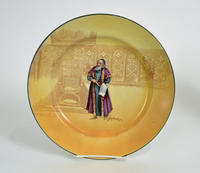
Royal Doulton Shakespeare seriesware with Shylock presenting his contract
Object
Royal Doulton dinner plate depicting Shylock from the Shakespeare play The Merchant of Venice. Shylock is a Jewish moneylender who demands that his contract for a pound of flesh, owed by a youth who failed to repay a loan, be paid in full. First published in 1600 in England, Shylock's characteristics were based upon long standing stereotypes still popular in a country where Jews had been expelled since 1290, 300 years. Although some scenes make him sympathetic, and show how society and his Christian enemies cruelly mistreat him, he is punished and forced to convert. The play was extremely popular in Nazi Germany, with fifty productions from 1933-1945. Despite the stereotypical and anti-Jewish elements, the play continues to spark debates over whether it must be considered antisemitic. The Royal Doulton Shakespeare seriesware was introduced in England in 1912, and produced into the early 1930s. The character is portrayed with recognizably Jewish features, a skull cap, sidecurls, and large nose, similar to 19th century stage performers. This plate is one of more than 900 items in the Katz Ehrenthal Collection of antisemitic artifacts and visual materials.

Porcelain figurine of a ribbon peddler in a red coat
Object
Brightly colored porcelain figurine of a Jewish peddler in red overcoat and green jacket selling ribbons and cloth from a tray hanging from his shoulder. Likely the work of 19th century Staffordshire potters, it resembles a work by Minton produced in several variations. Jewish peddlers were a familiar sight in 19th century London, especially following the large influx of East European Jews. Those who arrived with no money, could acquire goods on credit and immediately begin selling items on the street. Others were continuing the trade they had pursued previously. This figurine is one of more than 900 items in the Katz Ehrenthal Collection of antisemitic artifacts and visual materials.
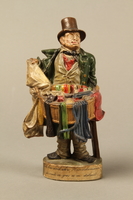
Terracotta figurine of a Jewish ribbon peddler with a basket of colorful cloth
Object
Colorful terracotta figurine modelled by Anton Sohn in in early 19th century Germany. It is a satirical depiction of an unpleasant looking and unkempt Jewish peddler selling ribbons. Sohn (1769-1841), trained as a church painter, established a workshop in Zizenhausen, Germany, that was celebrated for its exceptionally detailed and elaborate terracotta figurines. His subject matter ranged widely and included genre and satirical groups on popular, topical themes, and religious figurines which were favorites for Christmas displays in homes, as well as businesses. This figurine is one of more than 900 items in the Katz Ehrenthal Collection of antisemitic artifacts and visual materials.
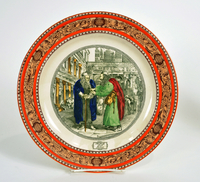
Adams dinner plate with an image of Shylock and Tubal in conversation
Object
William Adams and Sons dinner plate decorated with a colorful illustration of Shylock and Tubal from the Shakespeare play, The Merchant of Venice. Shylock is a Jewish moneylender who demands that his contract for a pound of flesh, owed by a youth who failed to repay a loan, be paid in full. Tubal is his friend and also a Jewish moneylender. First published in 1600 in England, Shylock's characteristics were based upon long standing stereotypes still popular in a country where Jews had been expelled since 1290, 300 years. Although some scenes make him sympathetic, and show how society and his Christian enemies cruelly mistreat him, he is punished and forced to convert. The play was extremely popular in Nazi Germany, with fifty productions from 1933-1945. Despite the stereotypical and anti-Jewish elements, the play continues to spark debates over whether it must be considered antisemitic. This plate is one of more than 900 items in the Katz Ehrenthal Collection of antisemitic artifacts and visual materials.
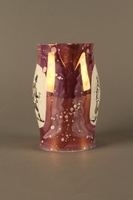
Gray's Pottery pitcher with two Henry Heath transfer printed images of Jewish peddlers
Object
Mottled, purple, lusterware, ceramic pitcher made by Gray’s Pottery in England, likely between 1948 and 1961. Gray’s Pottery, operated in England from 1907 until the early 1960’s. The pitcher depicts two, transfer printed illustrations of Jewish peddlers originally drawn by Henry Heath as part of his Scenes in London series around 1840. In the first image (Heath’s print number 24) an old clothes peddler is depicted with a large nose, sidelocks, and a beard; three stereotypical physical features commonly attributed to Jewish men. Clothes peddlers dealt in old garments they bought, cleaned and repaired, and then sold for profit. In the second image (print number 23) the other peddler is selling strings of garlic. To the ancient Israelites, garlic was a central concept of a good life as well as a key ingredient to many dishes. However, some associated Jews’ consumption of garlic with foetor judaicus, the antisemitic belief that Jews exuded a foul-smelling odor. During the 19th century, it was believed that Jews had an odor that resembled the smell of onion and garlic, caused by bad hygiene or a poor diet. Peddling was a common occupation for Jewish men during the 18th and 19th centuries. However, old prejudices formed an antisemitic stereotype of the Jewish peddler. The stereotype originated from the economic and professional restrictions placed on early European Jews. They were barred from owning land, farming, joining trade guilds, and military service. These restrictions limited Jews to the occupations of retail peddling, hawking, and moneylending. This canard was often visually depicted as a Jewish peddler, an untrustworthy figure that sold cut-rate items at inflated prices. This pitcher is one of the 900 items in the Katz Ehrenthal Collection of antisemitic artifacts and visual materials.
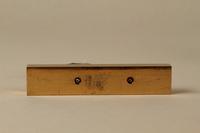
Painted metal figure of a Jew on skis with an umbrella
Object
Cut out, painted metal silhouette of a man with stereotypical Jewish features, most noticeably, a huge, hooked nose and red hair, on skies, holding an open black umbrella over his head. A Jew carrying an umbrella was a long standing stereotype, often used to refer to the on the move peddler, or, with more genteel figures, as a sign of the Jews pretentious claim to middle class respectability. European artisans commonly adorned everyday items such as ceramics, toys, and even walking sticks, with Jewish caricatures. This folk art piece is an example of racial antisemitism becoming part of everyday life. This figurine is one of the 900 items in the Katz Ehrenthal Collection of antisemitic artifacts and visual materials.
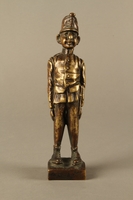
Comical figurine of a Jewish soldier, Austro-Hungarian Army
Object
Comical bronze figurine of a young, not especially promising, Jewish soldier. He appears to wear an Austro-Hungarian Army uniform, post-1908 Hechtgrau [pike gray] issue. The figurine was likely made a few years after this or in the early months of World War I (1914-1918). The figurine is one of more than 900 items in the Katz Ehrenthal Collection of antisemitic artifacts and visual materials.
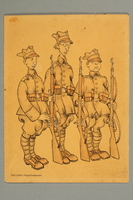
Ink caricature of three unlikely Polish Army recruits
Object
Cartoon, Eight Week Exercise, drawn by an unknown artist, of three very young, and comical looking, youth in ill fitting military uniforms, standing at parade rest. The uniform is likely that of the voluntary Polish Legion, although apart from the cap, in style and fit it resembles the uniform of the Polish Army Podhale Rifles regiment, circa 1930s. This drawing is one of more than 900 items in the Katz Ehrenthal Collection of antisemitic artifacts and visual materials.

Musical chamber pot with an image of Hitler
Object
Ceramic, musical chamber pot with an image of Adolf Hitler inside the bowl, made by S. Fielding & Co., after the German invasion of Poland in September 1939. Chamber pots are portable containers that were used as toilets before the widespread use indoor plumbing. In Great Britain, they were also known by the slang term, “Jerry.” Coincidentally, “Jerry” was also a slang term for Germans used by the British, and Hitler’s image on the pot is a reference to this double meaning. The rim text, “Another violation of Poland,” is a reference to the German invasion of Poland. The pot has a music box attached to the underside that plays a song when lifted. Depending on the version of the chamber pot either “Rule Britannia” or “God Save the King” is played. Similar chamber pots, as well as ashtrays, were made that featured images of Mussolini, Hermann Göring, and Stalin as well. By utilizing cultural slang terms that were easily recognized British citizens, this object ridiculed Hitler and helped instill a sense of national unity against the German threat, represented by his image. The chamber pot was made by S. Fielding & Co., an English pottery company that produced high-quality tableware, pottery, and decorative pieces. The chamber pots were produced only for a short time, as the subject matter was considered to be in bad taste. Although not antisemitic, this musical chamber pot is one of the more than 900 items in the Katz Ehrenthal Collection of antisemitic artifacts and visual materials.
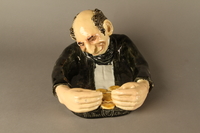
Ceramic change plate depicting a greedy Jew admiring his gold coins
Object
Antisemitic change plate modeled as Jewish man lovingly staring at the gathered coins in his outstretched arms. The man has large ears, a large curved nose, and fleshy lips; all stereotypical physical features commonly attributed to Jewish men. The man’s black clothing conforms to the Jewish concept of tzniyus (modest dress and behavior), which Orthodox Jews adhere to for religious reasons. Many antisemitic depictions of Jews show them hoarding, counting, or handling money. These stereotypes originated from the economic and professional restrictions placed on early European Jews. They were barred from owning land, farming, joining trade guilds, and military service. These restrictions forced many Jews into occupations such as money changing (exchanging foreign coins or currency for those used locally). Additionally, medieval religious belief held that charging interest (known as usury) was sinful, and the Jews who occupied these professions were looked down upon, predominantly by European Christians. They were perceived as morally deficient and willing to engage in unethical business practices. The inability of Jews to legally hold other occupations, combined with Christians’ disdain for the professions Jews were allowed to practice, helped form the canard of the greedy Jew who exploited Gentiles. This canard was often visually depicted as a Jewish man expressing an exaggerated desire for, or counting money. This change plate is one of the more than 900 items in the Katz Ehrenthal Collection of antisemitic artifacts and visual materials.
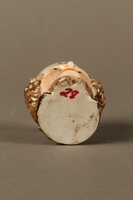
Porcelain drinking cup shaped as the head of a sneering Jewish man
Object
Small, colorful ceramic drinking cup in the shape of a Jewish man with an unpleasant facial expression. The piece is similar in style and production period to character mugs, which were ceramic mugs modeled on representations of popular characters. The man has thick eyebrows, hooded eyes, and fleshy red lips with curly hair; all stereotypical physical features commonly attributed to Jewish men. Stereotypes of the Jewish body are a common antisemitic trope. Malformities such as flat feet and bowed legs were used as justification to exclude Jews from the military, which was then used to indicate a lack of patriotism and masculinity in those men. Other physical features such as short, arched foreheads, large, hooked noses, and fleshy lips were believed to be predominant features of Jewish men. In antisemitic images, these features were applied to humans as well as animals commonly considered vermin or pests to indicate Jewishness. The idea of the large Jewish nose originated from craniological studies by Johann Friedrich Blumenbach (1752–1840) that claimed to identify a prominent nasal bone in Jewish people. Later scientific studies have proven that none of these features are more prominent in Jews than in any other population. However, these stereotypes were used by the Nazis to foment antisemitism, and many still permeate today. This drinking cup is one of the more than 900 items in the Katz Ehrenthal Collection of antisemitic artifacts and visual materials.
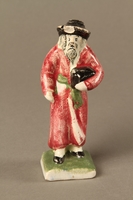
Small ceramic figure of a Jewish man in a long red coat
Object
Small ceramic figurine of a man, possibly a Jewish peddler, holding a small bundle. The man has a prominent, molded nose, with painted sidelocks and a beard; all stereotypical physical features commonly attributed to Jewish men. Peddlers were itinerant vendors who traveled the countryside and sold goods to the public. They usually traveled alone and carried their goods with them as they went. Peddling was a common occupation for young Jewish men during the 18th and 19th centuries. Most peddlers hoped their hard work would serve as a springboard to more lucrative and comfortable occupations. However, old prejudices formed an antisemitic stereotype of the Jewish peddler. The stereotype originated from the economic and professional restrictions placed on early European Jews. They were barred from owning land, farming, joining trade guilds, and military service. These restrictions limited Jews to the occupations of retail peddling, hawking, and moneylending. Additionally, medieval religious belief held that charging interest (known as usury) was sinful, and the Jews who occupied these professions were looked down upon, predominantly by European Christians. They were perceived as morally deficient and willing to engage in unethical business practices. The inability of Jews to legally hold other occupations, combined with Christians’ disdain for the professions Jews were allowed to practice, helped form the canard of the greedy Jew who exploited Gentiles. This canard was often visually depicted as a Jewish peddler, an untrustworthy figure that sold cut-rate items at inflated prices. This figurine is one of the more than 900 items in the Katz Ehrenthal Collection of antisemitic artifacts and visual materials.
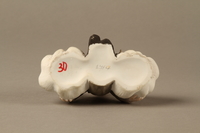
Bisque coin bank in the shape of a Jew with a garlic bulb under each arm
Object
Small, bisque, porcelain coin bank in the shape of a Jewish man sitting between two oversized bulbs of garlic. The man has several stereotypical physical features commonly attributed to Jewish men: a large nose and ears, sidelocks, a beard, and hooded eyes. The man’s coy facial expression and the placement of his open hands on the lower portions of the bulbs imply a carnal subtext with the bulbs. Garlic is a vegetable that has long been associated with Jews. To the ancient Israelites, garlic was a central concept of a good life as well as a key ingredient to many dishes. Babylonian rabbis also considered garlic a necessity for a good diet. However, Jews’ affinity for garlic had negative connotations as well. The ancient Romans derogatively called Jews “garlic eaters,” and the smell of garlic was widely associated with Jews. Some associated Jews’ consumption of garlic with foetor judaicus, the antisemitic belief that Jews exuded a foul-smelling odor. During the 19th century, it was believed that Jews had an odor that resembled the smell of onion and garlic, caused by bad hygiene or a poor diet. This coin bank is one of the 900 items in the Katz Ehrenthal Collection of antisemitic artifacts and visual materials.

Porcelain figure of a Jewish matchmaker with his umbrella
Object
Small, porcelain figurine of a Jewish Shadchan, in his traditional black suit and top hat, with a blue umbrella. In the 19th century, a Jewish man with an umbrella became a common stereotype and featured prominently in antisemitic depictions of Eastern European Jews. Umbrellas were a common accessory carried by Jewish peddlers who spent most of their time outdoors, and this stereotype may have originated with them. Shadchan (sometimes spelled, shadkhan) is the Hebrew term for a matchmaker, also known as a marriage broker. Male matchmakers are called “shadchans,” and female ones are called “shadchanit.” In return for financial compensation, a matchmaker would suggest prospective marriage mates based on the compatibility of the individuals and the suitability of their families. The matchmaker would then coach them through the courting process. Over time, the societal role of the matchmaker began to decline. However, the archetypal character of a Jewish matchmaker who glosses over physical and character defects of their clients has remained. This figurine is one of the more than 900 items in the Katz Ehrenthal Collection of antisemitic artifacts and visual materials.
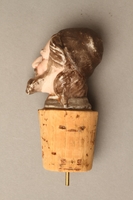
Cork bottle stopper with a porcelain finial depicting a Jewish stereotype
Object
Porcelain bottle stopper in the shape of a small bust, depicting a Jewish man’s head. It was created by Gardner Porcelain Works in Dmitrov, Russia, near the end of the 19th century. The man is wearing a skullcap and has a large hooked nose, sidelocks, a beard, and fleshy lips; all stereotypical physical features commonly attributed to Jewish men. Jews have historically been persecuted and demonized. They have been associated with and called “children of the devil,” accused of deicide, treacherous conspiracies, and treasonous acts by influential figures and archaic Christian beliefs. These defamations are often visually depicted through antisemitic or malevolent features and characteristics, such as horns and cloven feet. They have also been depicted with distorted facial features, including bulging eyes and large or hooked noses. Gardner Porcelain Works was established in 1766, and has produced fine porcelain ware for the public and the Russian monarchy. The company is still operating, and is a member of the Kremlin Suppliers Guild. This bottle stopper is one of the more than 900 items in the Katz Ehrenthal Collection of antisemitic artifacts and visual materials.
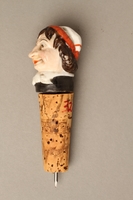
Cork bottle stopper with a porcelain finial depicting a Jewish stereotype
Object
Porcelain bottle stopper in the shape of a small bust depicting a Jewish man’s head, made in the Alsace region of central Europe during the 19th century. The man is wearing a skullcap and has a large nose, fat rosy cheeks, fleshy red lips, and hooded eyes; all stereotypical physical features commonly attributed to Jewish men. Jews have historically been persecuted and demonized. They have been associated with and called “children of the devil,” accused of deicide, treacherous conspiracies, and treasonous acts by influential figures and archaic Christian beliefs. These defamations are often visually depicted through antisemitic or malevolent features and characteristics, such as horns and cloven feet. They may also be depicted with distorted facial features, including bulging eyes and large or hooked noses. The Alsace region has a long history of crafting fine pottery that dates back to the Bronze Age. Many of the small villages in the region still have workshops that specialize in traditional techniques of decorating and creating pottery. This bottle stopper is one of the more than 900 items in the Katz Ehrenthal Collection of antisemitic artifacts and visual materials.
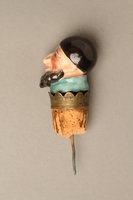
Cork bottle stopper with a porcelain finial depicting a Jewish stereotype
Object
Porcelain bottle stopper in the shape of a small bust depicting a Jewish man’s head, made in the Alsace region of central Europe during the 19th century. The man is wearing a skullcap and has a large nose, fleshy red lips, hooded eyes, and a black pointed beard; all stereotypical physical features commonly attributed to Jewish men. Jews have historically been persecuted and demonized. They have been associated with and called “children of the devil,” accused of deicide, treacherous conspiracies, and treasonous acts by influential figures and archaic Christian beliefs. These defamations are often visually depicted through antisemitic or malevolent features and characteristics, such as horns and cloven feet. They may also be depicted with distorted facial features, including bulging eyes and large or hooked noses. The Alsace region has a long history of crafting fine pottery that dates back to the Bronze Age. Many of the small villages in the region still have workshops that specialize in traditional techniques of decorating and creating pottery. This bottle stopper is one of the more than 900 items in the Katz Ehrenthal Collection of antisemitic artifacts and visual materials.
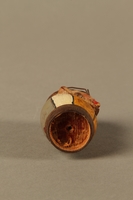
Bottle stopper with a wooden finial depicting a Jewish stereotype
Object
Carved and painted wooden bottle stopper in the shape of a small bust, depicting a Jewish man. It was made in Germany, approximately 1870. The man has a large hooked nose, fleshy red lips, and a beard all stereotypical physical features commonly attributed to Jewish men. Jews have historically been persecuted and demonized. They have been associated with and called “children of the devil,” accused of deicide, treacherous conspiracies, and treasonous acts by influential figures and archaic Christian beliefs. These defamations are often visually depicted through antisemitic or malevolent features and characteristics, such as horns and cloven feet. They have also been depicted with distorted facial features, including bulging eyes and large or hooked noses. This bottle stopper is one of the more than 900 items in the Katz Ehrenthal Collection of antisemitic artifacts and visual materials.
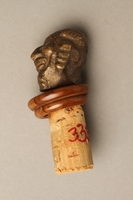
Cork bottle stopper with a bronze finial depicting a Jewish stereotype
Object
Bronze bottle stopper in the shape of a small bust, depicting a Jewish man’s head made in Austria during the 19th century. The man is wearing a skullcap and has a large nose, fleshy lips, hooded eyes, a beard, and sidelocks; all stereotypical physical features commonly attributed to Jewish men. Jews have historically been persecuted and demonized. They have been associated with and called “children of the devil,” accused of deicide, treacherous conspiracies, and treasonous acts by influential figures and archaic Christian beliefs. These defamations are often visually depicted through antisemitic or malevolent features and characteristics, such as horns and cloven feet. They have also been depicted with distorted facial features, including bulging eyes and large or hooked noses. This bottle stopper is one of the more than 900 items in the Katz Ehrenthal Collection of antisemitic artifacts and visual materials.
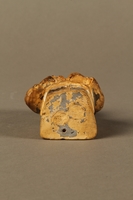
Unpleasant looking bust of a Jewish man picking his nose
Object
Painted ceramic figurine in the shape of a caricatured Jewish man picking his nose, made in approximately 1820. The man is wearing a skullcap and has a large hooked nose, fleshy lips, hooded eyes, sidelocks, and curly hair; all stereotypical physical features commonly attributed to Jewish men. The action of the man picking his nose may be an attempt to draw attention to the stereotype of the large Jewish nose. Jews have historically been persecuted and demonized through the use of antisemitic or malevolent physical features and characteristics, such as horns and cloven feet. They may also be depicted with distorted facial features, including bulging eyes and large or hooked noses. The action of nose picking is also generally condemned and thought of as inappropriate or unclean in most cultures. This reinforces the stereotype of Jews as dirty and vectors of disease. Pejoratives such as “dirty Jew” and antisemitic myths such as a Jewish odor caused by bad hygiene or a poor diet were common during the 19th century. This bust is one of the more than 900 items in the Katz Ehrenthal Collection of antisemitic artifacts and visual materials.
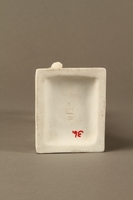
White porcelain figurine of a Jewish matchmaker with his umbrella
Object
White Parian porcelain figurine, possibly a shadchan, manufactured by Gardner Porcelain Works in Verbilki, Russia, near the end of the 19th century. The man is wearing a skullcap and has a large nose, sidelocks, a beard, and fleshy lips; all stereotypical physical features commonly attributed to Jewish men. In the 19th century, a Jewish man with an umbrella became a common stereotype and featured prominently in antisemitic depictions of Eastern European Jews. Umbrellas were a common accessory carried by Jewish peddlers who spent most of their time outdoors, and this stereotype may have originated with them. Shadchan (sometimes spelled, shadkhan) is the Hebrew term for a matchmaker, also known as a marriage broker. Male matchmakers are called “shadchans,” and female ones are called “shadchanit.” In return for financial compensation, a matchmaker would suggest prospective marriage mates based on the compatibility of the individuals and the suitability of their families. The matchmaker would then coach them through the courting process. Over time, the societal role of the matchmaker began to decline. However, the archetypal character of a Jewish matchmaker who glosses over physical and character defects of their clients has remained. Gardner Porcelain Works was established in 1766, and has produced fine porcelain ware for the public and the Russian monarchy. The company is still operating, and is a member of the Kremlin Suppliers Guild. This figurine is one of the more than 900 items in the Katz Ehrenthal Collection of antisemitic artifacts and visual materials.

Ceramic jug shaped as a comical Jewish man with a collection box
Object
Toby jug depicting a man holding a collection box, made in England during the 19th century. Toby jugs were first made in the mid-18th century and are ceramic pitchers usually modeled on full-bodied representations of popular characters. The man has a large nose, fat rosy cheeks, and thick, dark eyebrows; all stereotypical physical features commonly attributed to Jewish men. The phrase “I PAY OUT” may be a reference to the stereotype of the greedy Jew. This stereotype dates back to the Middle Ages, when economic and professional restrictions were placed on early European Jews. These restrictions limited many Jews to the occupations of retail peddling, hawking, and moneylending. Additionally, medieval religious belief held that charging interest (known as usury) was sinful, and the Jews who occupied these professions were looked down upon, predominantly by European Christians. They were perceived as morally deficient and willing to engage in unethical business practices. The inability of Jews to legally hold other occupations, combined with Christians’ disdain for the professions Jews were allowed to practice, helped form the canard of the greedy Jew who exploited Gentiles. The word “Ikey” (sometimes spelled Iky, or phrased as “Ikey Mo”) is a derogatory British term for a Jewish person. The word is an abbreviated version of the Jewish name Isaac (and Mo is an abbreviation of Moses). The term may have originated with the Ally Sloper cartoon series that began running in the British satirical magazine, “Judy,” in August 1867. However, it could have also originated as a reference to the nickname of a well-known Jewish convict, Isaac 'Ikey' Solomon or Solomons, in Britain and Australia during the first half of the 19th century. This toby jug is one of the more than 900 items in the Katz Ehrenthal Collection of antisemitic artifacts and visual materials.
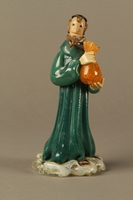
Murano glass figure of a Jew holding a full money bag
Object
Murano glass figurine of a Jewish man holding a large sack of money, with a vacant expression on his face. The man is wearing a skullcap and has a large nose, sidelocks, and a beard; all stereotypical physical features commonly attributed to Jewish men. The moneybag in his hands is a reference to the stereotype of the greedy Jew. This stereotype dates back to the Middle Ages, when economic and professional restrictions were placed on early European Jews. These restrictions limited many Jews to the occupations of retail peddling, hawking, and moneylending. Additionally, medieval religious belief held that charging interest (known as usury) was sinful, and the Jews who occupied these professions were looked down upon, predominantly by European Christians. They were perceived as morally deficient and willing to engage in unethical business practices. The inability of Jews to legally hold other occupations, combined with Christians’ disdain for the professions Jews were allowed to practice, helped form the canard of the greedy Jew who exploited Gentiles. Murano glass comes from the small island of Murano in Venice, Italy. Glassmaking on the island dates back to 1291, when the Venetian government ordered the glassmakers to relocate to Murano as a precautionary measure against fire. During creation, the glass is mixed with minerals to give it vibrant colors. The mixture is then mouth-blown and handcrafted into a range of forms and shapes by glassmakers. This statue is one of the more than 900 items in the Katz Ehrenthal Collection of antisemitic artifacts and visual materials.
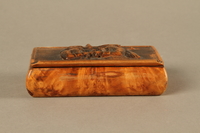
Wood snuff box with a carving of three Jewish hareskin dealers
Object
Wood snuff box with an image of three Jewish hareskin dealers carved on the lid. Snuffboxes were used to store smokeless tobacco, called snuff, which was inhaled through the nose. The use of snuff became popular in Europe during the 18th century. Snuffboxes were made in a variety of shapes and sizes. Smaller snuffboxes were carried by individuals, and large boxes were set on tables or other furniture and remained stationary. The boxes were made from several different materials, including wood, metal, ivory, and animal horns. They were often ornately decorated with jewels, precious metals, paintings or carvings. The image on the snuffbox depicts the Jewish hareskin dealers with stereotypically hooked noses, hooded eyes, beards, and pointed teeth. The scene, possibly based on a Dutch folktale about three Jewish hareskin dealers who swindle a miserly farmer, can be traced back to the lithographic printing firm of Johan Martin Billroth, which opened in 1829 in Groningen, Netherlands. This image was popular in northern Europe in the early 19th century and was reproduced in various mediums. The snuffbox is one of more than 900 items in the Katz Ehrenthal Collection of antisemitic artifacts and visual materials.
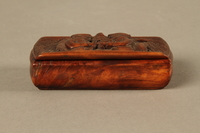
Carved snuff box with an image of three Jewish hareskin dealers
Object
Coquilla nut snuffbox with an image of three Jewish hareskin dealers carved on the lid. Snuffboxes were used to store smokeless tobacco, called snuff, which was inhaled through the nose. The use of snuff became popular in Europe during the 18th century. Snuffboxes were made in a variety of shapes and sizes. Smaller snuffboxes were carried by individuals, and large boxes were set on tables or other furniture and remained stationary. The boxes were made from several different materials, including wood, metal, ivory, and animal horns. They were often ornately decorated with jewels, precious metals, paintings or carvings. The image on the snuffbox depicts the Jewish hareskin dealers with stereotypically hooked noses, hooded eyes, beards, and pointed teeth. The scene, possibly based on a Dutch folktale about three Jewish hareskin dealers who swindle a miserly farmer, can be traced back to the lithographic printing firm of Johan Martin Billroth, which opened in 1829 in Groningen, Netherlands. This image was popular in northern Europe in the early 19th century and was reproduced in various mediums. The snuffbox is one of more than 900 items in the Katz Ehrenthal Collection of antisemitic artifacts and visual materials.
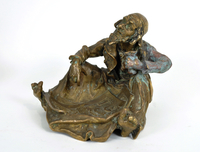
Bronze figurine in the shape of a seated Jewish fortune teller
Object
Bronze figure of a seated Jewish fortune teller depicted with oversized tarot cards made in Austria during the 19th century. It is possible that this figure was used to hold calling cards, or even as an ashtray. Although the Bible forbid Jews from using divination and magic, Jews were still associated with the magic and mysticism in the eyes of many non-Jews (Gentiles). The accusations stemmed from a combination of antisemitic beliefs, including pre-modern ignorance about the causes of natural phenomena like weather, fear of “others” (individuals or groups from outside the population majority or with nonlocal origins), and ignorance of Jewish language and religious practices. Throughout the Middle Ages in Western Europe, Jews were falsely accused of many malicious acts, including ritual murder, performing satanic black masses, and using amulets and talismans for occult sciences. It was believed that Jewish religious texts, written in Hebrew, with its different characters and right-to-left orientation, contained spells or secret knowledge that could only be used by initiated members. In Eastern Europe, many Gentiles believed Jews possessed the ability to control the weather. Folk tales accused Jews of using the holiday, Sukkot, which celebrates the gathering of the harvest and commemorates the protection God provided for the children of Israel when they left Egypt, as a Jewish ritual event to control the weather. It was believed that the Jewish ritual dances and prayers called, Tefillat Hageshem, were used to invoke rain. This statue is one of the more than 900 items in the Katz Ehrenthal Collection of antisemitic artifacts and visual materials.

Bisque figurine of a Jew in a white plasterer’s coat and gray boots
Object
Porcelain bisque figurine of a Jewish man, possibly an ashtray or change plate, made in Germany. The man has a large nose, sidelocks, large ears, a beard, hooded eyes, and fleshy lips; all stereotypical physical features commonly attributed to Jewish men. The text on the figurine indicates the man is bemoaning the spa tax in Carlsbad, Austria-Hungary (now Karlovy Vary, Czech Republic). Carlsbad is a European town located on a thermal spring, and has accommodations that use those springs for their medicinal and rejuvenating properties. Many European spa towns can trace their histories back to ancient Roman settlements. During the 18th and 19th centuries, European spa towns became increasingly popular as centers for health and social destinations for the affluent, the nobility, and European royalty. During this time, seemingly large numbers of Jewish guests also frequented the spa towns. However, antisemitic sentiment was also present. Derogatory postcards, called Judenspottkarten [Jew-mocking cards], and other souvenirs were produced and sold. The figurine lamenting the cost of the services at the spa town is a reference to the stereotype of the greedy Jew. This stereotype dates back to the Middle Ages, when economic and professional restrictions limited many Jews to the occupations of retail peddling, hawking, and moneylending. Additionally, medieval religious belief held that charging interest (known as usury) was sinful, and the Jews who occupied these professions were perceived as morally deficient and willing to engage in unethical business practices. These factors formed the canard of the greedy Jew who exploited Gentiles. This figurine is one of the more than 900 items in the Katz Ehrenthal Collection of antisemitic artifacts and visual materials.
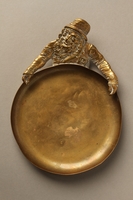
Cast brass figure of a Jew holding an ashtray
Object
Antisemitic ashtray modeled as Jewish man holding a large tray in is arms. The man has a large nose, a long beard, sidelocks, and thick eyebrows; all stereotypical physical features commonly attributed to Jewish men. The figure may be a representation of a Jewish peddler. Peddlers, often depicted carrying trays, were itinerant vendors who traveled the countryside and sold goods to the public. They usually traveled alone and carried their goods with them as they went. Peddling was a common occupation for young Jewish men during the 18th and 19th centuries. Most peddlers hoped their hard work would serve as a springboard to more lucrative and comfortable occupations. However, old prejudices formed an antisemitic stereotype of the Jewish peddler. The stereotype originated from the economic and professional restrictions placed on early European Jews. They were barred from owning land, farming, joining trade guilds, and military service. These restrictions limited Jews to the occupations of retail peddling, hawking, and moneylending. Additionally, medieval religious belief held that charging interest (known as usury) was sinful, and the Jews who occupied these professions were looked down upon, predominantly by European Christians. They were perceived as morally deficient and willing to engage in unethical business practices. The inability of Jews to legally hold other occupations, combined with Christians’ disdain for the professions Jews were allowed to practice, helped form the canard of the greedy Jew who exploited Gentiles. This canard was often visually depicted as a Jewish peddler, an untrustworthy figure that sold cut-rate items at inflated prices. This ashtray is one of the more than 900 items in the Katz Ehrenthal Collection of antisemitic artifacts and visual materials.
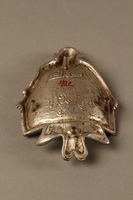
Metal ashtray in the form of a Jewish man holding a tray
Object
Metal ashtray from the 19th century, in the form of a Jewish peddler holding an empty tray. The man has several stereotypical physical features commonly attributed to Jewish men: a large nose, hooded eyes, sidelocks, and a beard. Peddlers were itinerant vendors who traveled the countryside and sold goods to the public. They usually travelled alone and carried their goods with them as they went. Peddling was a common occupation for young Jewish men during the 18th and 19th centuries. Most peddlers hoped their hard work would serve as a springboard to more lucrative and comfortable occupations. However, old prejudices formed an antisemitic stereotype of the Jewish peddler. The stereotype originated from the economic and professional restrictions placed on early European Jews. They were barred from owning land, farming, joining trade guilds, and military service. These restrictions limited Jews to the occupations of retail peddling, hawking, and moneylending. Additionally, medieval religious belief held that charging interest (known as usury) was sinful, and the Jews who occupied these professions were looked down upon, predominantly by European Christians. They were perceived as morally deficient and willing to engage in unethical business practices. The inability of Jews to legally hold other occupations, combined with Christians’ disdain for the professions Jews were allowed to practice, helped form the canard of the greedy Jew who exploited Gentiles. This canard was often visually depicted as a Jewish peddler, an untrustworthy figure that sold cut-rate items at inflated prices. Often, they were shown carrying a sack on their back or a tray around their midsection. This ashtray is one of the more than 900 items in the Katz Ehrenthal Collection of antisemitic artifacts and visual materials.
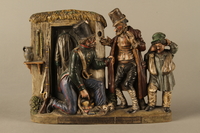
Terracotta of a customs officer harassing a Jewish peddler and his son
Object
Colorful terracotta figure group based upon a watercolor, Customs House, created by Hieronymous Hess in 1838. The sculpture was modelled by Anton Sohn in early 19th century Germany. It shows a uniformed French customs agent tormenting a comically dressed Jewish peddler and his small crying son by grinding his foot in the merchant's open sack of belongings. The work has many painted and molded details. Sohn (1769-1841), trained as a church painter, established a workshop in Zizenhausen, Germany, that was celebrated for its exceptionally detailed and elaborate terracotta figurines. His subject matter ranged widely and included genre and satirical groups on popular, topical themes, and religious figurines which were favorites for Christmas displays in homes, as well as businesses. This figure group is one of the more than 900 items in the Katz Ehrenthal Collection of antisemitic artifacts and visual materials.
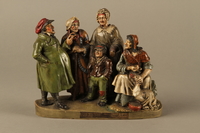
Colorful terracotta figure group of a Jewish family dressed for Sabbath
Object
Colorful terracotta figure group based upon a watercolor, A Feast Day, created by Hieronymous Hess in 1838. The sculpture was modelled by Anton Sohn in early 19th century Germany. It is a tableaux of a Jewish family, one man, three women, and a young boy, conversing and dressed in what are probably their best clothes, although they are shabby and patched. Sohn (1769-1841), trained as a church painter, established a workshop in Zizenhausen, Germany, that was celebrated for its exceptionally detailed and elaborate terracotta figurines. His subject matter ranged widely and included genre and satirical groups on popular, topical themes, and religious figurines which were favorites for Christmas displays in homes, as well as businesses. This figure group is one of the more than 900 items in the Katz Ehrenthal Collection of antisemitic artifacts and visual materials.
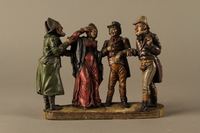
Terracotta figurine of a Jewish marriage negotiation
Object
Colorful terracotta figure group, Lydia is Married, modelled by Anton Sohn in early 19th century Germany. It depicts four figures, a Jewish man, presenting his daughter to a prospective groom, while bargaining with the matchmaker. Sohn (1769-1841), trained as a church painter, had a workshop in Zizenhausen, Germany, that was celebrated for its exceptionally detailed and elaborate terracotta figurines. His subject matter ranged widely and included genre and satirical groups on popular, topical themes, and religious figurines which were favorites for Christmas displays in homes, as well as businesses. This figure group is one of the more than 900 items in the Katz Ehrenthal Collection of antisemitic artifacts and visual materials.
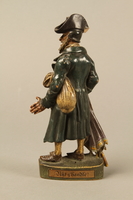
Terracotta figurine of a Jewish haggler
Object
Colorful terracotta figurine, The Schacherjude [The Haggling Jew], modelled by Anton Sohn in early 19th century Germany. It is a satirical depiction of a negative Jewish stereotype, the bargainer, an upright figure in a black tricorn hat, coat, and an umbrella, gesturing and yelling to someone. Sohn (1769-1841), trained as a church painter, established a workshop in Zizenhausen, Germany, that was celebrated for its exceptionally detailed and elaborate terracotta figurines. His subject matter ranged widely and included genre and satirical groups on popular, topical themes, and religious figurines which were favorites for Christmas displays in homes, as well as businesses. This figurine is one of the more than 900 items in the Katz Ehrenthal Collection of antisemitic artifacts and visual materials.
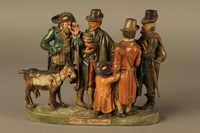
Colorful terracotta figure group of 4 Jewish men, a boy, and a goat
Object
Colorful terracotta figure group, Kinder Israel, modelled by Anton Sohn in early 19th century Germany. It is a caricatured depiction of Jewish stereotypes, including the livestock dealer, the scholar/student, and the peddler. Sohn (1769-1841), trained as a church painter, established a workshop in Zizenhausen, Germany, that was celebrated for its exceptionally detailed and elaborate terracotta figurines. His subject matter ranged widely and included genre and satirical groups on popular, topical themes, and religious figurines which were favorites for Christmas displays in homes, as well as businesses. This figure group is one of the more than 900 items in the Katz Ehrenthal Collection of antisemitic artifacts and visual materials.
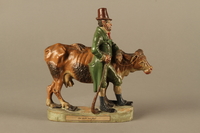
Terracotta figurine of a Jewish peddler with an underfed cow
Object
Colorful terracotta figurine of a Jewish dealer and a bony, worn out cow, modelled by Anton Sohn in early 19th century Germany. It is a satirical depiction of the stereotypical Jewish peddler who always tries to cheat. While the figure is clearly Jewish, the features are not exagerrated to get the point across, reflecting how deeply the concept of the deceitful Jewish salesman was embedded in the culture. Many of Sohn's works were based upon drawings by Hieronymus Hess. This work is on his style, but the original is not known. Sohn (1769-1841), trained as a church painter, established a workshop in Zizenhausen, Germany, that was celebrated for its exceptionally detailed and elaborate terracotta figurines. His subject matter ranged widely and included genre and satirical groups on popular, topical themes, and religious figurines which were favorites for Christmas displays in homes, as well as businesses. This figurine is one of the more than 900 items in the Katz Ehrenthal Collection of antisemitic artifacts and visual materials.
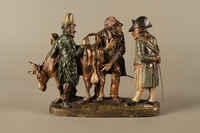
Terracotta figure group of 2 Jewish traders selling an old sagging cow
Object
Colorful terracotta figure group, Horse Trading, modelled by Anton Sohn in early 19th century Germany. It is a satirical and vulgar depiction of two Jewish cattle dealers using deceptive word play to sell an old, worn out cow to a German gentleman. Sohn (1769-1841), trained as a church painter, established a workshop in Zizenhausen, Germany, that was celebrated for its exceptionally detailed and elaborate terracotta figurines. His subject matter ranged widely and included genre and satirical groups on popular, topical themes, and religious figurines which were favorites for Christmas displays in homes, as well as businesses. This figure group is one of the more than 900 items in the Katz Ehrenthal Collection of antisemitic artifacts and visual materials.
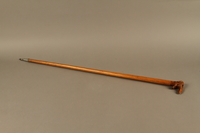
Wooden cane with a grip shaped as a Jewish man’s elongated nose
Object
Oak walking stick with a changeable carved handle shaped as the head of a Jewish man with kippah and pointy beard. European artisans commonly adorned everyday items such as ceramics, toys, and even walking sticks, with caricatures of Jewish faces. These walking sticks are examples of racial antisemitism becoming part of everyday life. This cane is one of the more than 900 items in the Katz Ehrenthal Collection of antisemitic artifacts and visual materials.
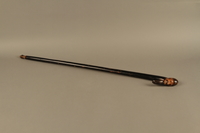
Wooden cane with a carved Orthodox Jewish man's beard as the grip
Object
Black painted walking stick carved from a single piece of wood with the handle made in the shape of a grotesque looking Orthodox Jewish man with a kippah. European artisans commonly adorned everyday items such as ceramics, toys, and even walking sticks, with caricatures of Jewish faces. These walking sticks are examples of racial antisemitism becoming part of everyday life. This cane is one of the more than 900 items in the Katz Ehrenthal Collection of antisemitic artifacts and visual materials.
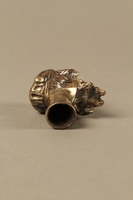
Silver plated cane knob shaped as a Jewish man in cap with sidelocks
Object
Cast silver plated walking stick handle in the shape of the head of a Jewish peddler with side locks and sharply pointed nose. It has a hollow, open tubular neck made to be inserted over a cylindrical shaft. The soft cap and unkempt appearance were commonly used in representations of both Jewish peddlers and beggars, stock figures often portrayed in popular culture. European artisans commonly adorned everyday items such as ceramics, toys, and even walking sticks, with caricatures of Jewish faces. These walking stick knobs are examples of racial antisemitism becoming part of everyday life. This walking stick knob is one of the more than 900 items in the Katz Ehrenthal Collection of antisemitic artifacts and visual materials.
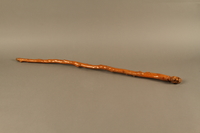
Wooden cane with a carved grip of a beardless Jew with distorted features
Object
Carved natural wood walking stick with a knob handle shaped as a Jewish man with an oversize nose and lips. European artisans commonly adorned everyday items such as ceramics, toys, and even walking sticks, with caricatures of Jewish faces. These walking sticks are examples of racial antisemitism becoming part of everyday life. This cane is one of the more than 900 items in the Katz Ehrenthal Collection of antisemitic artifacts and visual materials.
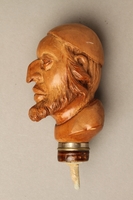
Wooden walking stick knob carved as Fagin’s head
Object
Wooden knob handle for a figural walking stick carved in the shape of a Jewish man's head with stereotypically Jewish features and a sinister appearance. The name Fagin is carved on the back, although it does not resemble the descriptions of the devil-like Jewish character Fagin from the novel, Oliver Twist, written by Charles Dickens in 1837-8. European artisans commonly adorned everyday items such as ceramics, toys, and even walking sticks, with caricatures of Jewish faces. The name Fagin may have been added to expand the market for the item. Items such as this walking stick knob are examples of racial antisemitism becoming part of everyday life. Fagin, referred to as The Jew, is a "villainous and repulsive" character with black nails and teeth like fangs, who kidnaps small children and trains them to be thieves. Dickens expressed a common 19th century prejudice, saying that if he had a character who was a fence, a dealer in stolen goods, he had to be a Jew because "that class of criminal almost invariably was a Jew." This walking stick knob is one of the more than 900 items in the Katz Ehrenthal Collection of antisemitic artifacts and visual materials.This walking stick knob is one of the more than 900 items in the Katz Ehrenthal Collection of antisemitic artifacts and visual materials.
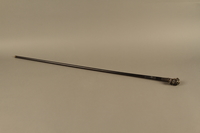
Black wooden cane with a silver grip of a Jewish peddler's head
Object
Black wooden cane with a changeable cast silver plated knob handle in the shape of the head of a Jewish peddler with side locks and sharply pointed nose. It has a hollow, open tubular neck that inserts over the cylindrical shaft. The soft cap and unkempt appearance were commonly used in representations of both Jewish peddlers and beggars, stock figures often portrayed in popular culture. European artisans commonly adorned everyday items such as ceramics, toys, and even walking sticks, with caricatures of Jewish faces. These walking sticks are examples of racial antisemitism becoming part of everyday life.This walking stick is one of the more than 900 items in the Katz Ehrenthal Collection of antisemitic artifacts and visual materials.
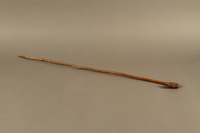
Walking stick with the crudely carved head of a Jewish man
Object
Slender walking stick made from a single stick with a knob handle carved as a grotesque caricature of a Jewish man. European artisans commonly adorned everyday items such as ceramics, toys, and even walking sticks, with caricatures of Jewish faces. These walking sticks are examples of racial antisemitism becoming part of everyday life. This walking stick is one of the more than 900 items in the Katz Ehrenthal Collection of antisemitic artifacts and visual materials.

Wooden cane with a carved grip of a Jewish man with painted eyes
Object
Walking stick made from a single stick with a head carved in the shape of a young Jewish man in a cap. European artisans commonly adorned everyday items such as ceramics, toys, and even walking sticks, with caricatures of Jewish faces. These walking sticks are examples of racial antisemitism becoming part of everyday life.This walking stick is one of the more than 900 items in the Katz Ehrenthal Collection of antisemitic artifacts and visual materials.
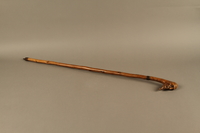
Wooden cane with a grip carved as grotesque Jewish man
Object
Wooden walking staff with a grip handle carved as a Jewish man with a huge nose and a grimace that reveals his missing teeth. European artisans commonly adorned everyday items such as ceramics, toys, and even walking sticks, with caricatures of Jewish faces. These walking sticks are examples of racial antisemitism becoming part of everyday life.This walking stick is one of the more than 900 items in the Katz Ehrenthal Collection of antisemitic artifacts and visual materials.
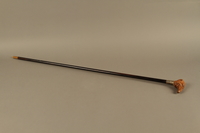
Black wooden cane with a grip carved as a Jewish man’s elongated nose
Object
Black wooden cane with an attached, probably changeable, grip carved as a Jewish man’s elongated nose. European artisans commonly adorned everyday items such as ceramics, toys, and even walking sticks, with caricatures of Jewish faces. These walking sticks are examples of racial antisemitism becoming part of everyday life. This walking stick is one of the more than 900 items in the Katz Ehrenthal Collection of antisemitic artifacts and visual materials.
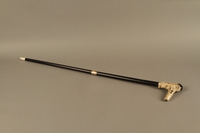
Cane with a bone grip carved as a caricatured Jewish man's head with warts
Object
Walking stick with a black wooden shaft and a changeable bone handle carved as the exaggerated, caricatured head of an unattractive Jewish man with one gold tooth and an extremely elongated nose with big warts. European artisans commonly adorned everyday items such as ceramics, toys, and even walking sticks, with caricatures of Jewish faces. These walking sticks are examples of racial antisemitism becoming part of everyday life. This cane is one of the more than 900 items in the Katz Ehrenthal Collection of antisemitic artifacts and visual materials.
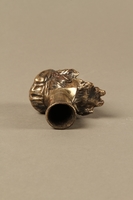
Bronze cane knob in the shape of a squinting Jewish man’s head
Object
Bronze cane knob cast in the shape of a Jewish man's head, wearing a patched kippah. European artisans commonly adorned everyday items such as ceramics, toys, and even walking sticks, with caricatures of Jewish faces. These walking sticks are examples of racial antisemitism becoming part of everyday life. This cane knob is one of the more than 900 items in the Katz Ehrenthal Collection of antisemitic artifacts and visual materials.
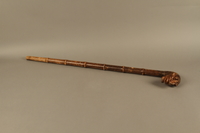
Crook handled staff with a carved Jewish head with bulging eyes
Object
Crook handled walking stick with an intricately carved head of a Jewish man with bulging eyes, and a patterned, segmented shaft giving it a snakelike appearance. European artisans commonly adorned everyday items such as ceramics, toys, and even walking sticks, with caricatures of Jewish faces. These walking sticks are examples of racial antisemitism becoming part of everyday life. This cane is one of the more than 900 items in the Katz Ehrenthal Collection of antisemitic artifacts and visual materials.
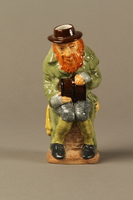
Toby Jug of a seated Fagin clutching his treasure box
Object
Toby jug depicting Fagin holding a collection box, made by Wood & Sons for Franklin Porcelain in London, England. Toby jugs were first made in the mid-18th century and are ceramic pitchers usually modeled on full-bodied representations of popular characters. This Toby jug was designed by English cartoonist, Peter Jackson, and one of a set of 12, modeled on popular Charles Dickens' characters. Fagin is portrayed with red hair, a beard, a large nose, thick eyebrows, and hooded eyes; all stereotypical physical features attributed to Jewish men. In “Oliver Twist,” Fagin is the villainous leader of a gang of children whom he has instructed in the ways of criminality. He attempts to corrupt the protagonist, Oliver, in the same manner. In the novel, Fagin is described in his first scene as hunched over a fire holding a toasting fork, imagery that reinforces the antisemitic stereotype of Jewish associations with the devil, due to its resemblance of a pitchfork. He is repeatedly referred to as “the Jew” in the book and also emphasized as a greedy, miserly, and cowardly character; all traits aligning with common antisemitic stereotypes. However, in a later edition of the novel, Dickens reduced his use of “the Jew,” substituting it for pronouns or other phrases. Even in this later version, Fagin is still repeatedly and negatively referred to as “the Jew,” and remains emblematic of multiple antisemitic canards. Later writings by Dickens portrayed Jews in a more positive light, however, the reprehensible Fagin is his most remembered Jewish character. This pitcher is one of the more than 900 items in the Katz Ehrenthal Collection of antisemitic artifacts and visual materials.
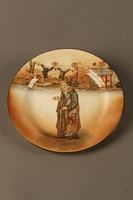
Royal Doulton Dickens Ware dinner plate decorated with an image of Fagin
Object
Dickens Ware series plate featuring an image of Fagin, made by Royal Doulton in England during the 20th century. Royal Doulton is an English ceramic manufacturer that specializes in artistically styled, decorated ceramics and tableware. In 1889, Charles Noke joined the company. He later introduced Doulton Series Ware, plates, and other items with decorations based on characters from popular culture. In 1908, Royal Doulton introduced the Dickens Ware series based on Charles Dickens’ characters, which was originally produced until 1937. A second run of the series was produced mid-century. On the plate, Fagin is portrayed with a beard and a large nose; both stereotypical physical features attributed to Jewish men. In “Oliver Twist,” Fagin is the villainous leader of a gang of children whom he has instructed in the ways of criminality. He attempts to corrupt the protagonist, Oliver, in the same manner. In the novel, Fagin is first seen hunched over a fire holding a toasting fork, imagery that reinforces the antisemitic stereotype of Jewish associations with the devil, due to its resemblance of a pitchfork. He is repeatedly referred to as “the Jew” in the book and is emphasized as a greedy, miserly, and cowardly character, all traits aligning with common antisemitic stereotypes. However, in a later edition of the novel, Dickens reduced his use of “the Jew,” substituting it for pronouns or other phrases. Even in this later version, Fagin is still repeatedly, and negatively, referred to as “the Jew” and remains emblematic of multiple antisemitic canards. Later writings by Dickens portrayed Jews in a more positive light, however, the reprehensible Fagin is his most remembered Jewish character. This plate is one of the more than 900 items in the Katz Ehrenthal Collection of antisemitic artifacts and visual materials.
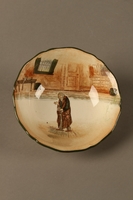
Royal Doulton Dickens Ware bowl decorated with an image of Fagin
Object
Dickens Ware series bowl featuring an image of Fagin, made by Royal Doulton in England during the 20th century. Royal Doulton is an English ceramic manufacturer that specializes in artistically styled, decorated ceramics and tableware. In 1889, Charles Noke joined the company. He later introduced Doulton Series Ware, plates, and other items with decorations based on characters from popular culture. In 1908, Royal Doulton introduced the Dickens Ware series based on Charles Dickens’ characters, which was originally produced until 1937. A second run of the series was produced mid-century. On the bowl, Fagin is portrayed with a beard and a large nose; both stereotypical physical features attributed to Jewish men. In “Oliver Twist,” Fagin is the villainous leader of a gang of children whom he has instructed in the ways of criminality. He attempts to corrupt the protagonist, Oliver, in the same manner. In the novel, Fagin is first seen hunched over a fire holding a toasting fork, imagery that reinforces the antisemitic stereotype of Jewish associations with the devil, due to its resemblance of a pitchfork. He is repeatedly referred to as “the Jew” in the book and is emphasized as a greedy, miserly, and cowardly character, all traits aligning with common antisemitic stereotypes. However, in a later edition of the novel, Dickens reduced his use of “the Jew,” substituting it for pronouns or other phrases. Even in this later version, Fagin is still repeatedly, and negatively, referred to as “the Jew” and remains emblematic of multiple antisemitic canards. Later writings by Dickens portrayed Jews in a more positive light, however, the reprehensible Fagin is his most remembered Jewish character. This bowl is one of the more than 900 items in the Katz Ehrenthal Collection of antisemitic artifacts and visual materials.
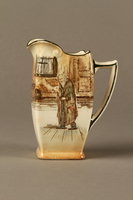
Royal Doulton Dickens Ware pitcher decorated with an image of Fagin
Object
Dickens Ware series pitcher featuring an image of Fagin, made by Royal Doulton in England during the 20th century. Royal Doulton is an English ceramic manufacturer that specializes in artistically styled, decorated ceramics and tableware. In 1889, Charles Noke joined the company. He later introduced Doulton Series Ware, plates, and other items with decorations based on characters from popular culture. In 1908, Royal Doulton introduced the Dickens Ware series based on Charles Dickens’ characters, which was originally produced until 1937. A second run of the series was produced mid-century. On the pitcher, Fagin is portrayed with a beard and a large nose; both stereotypical physical features attributed to Jewish men. In “Oliver Twist,” Fagin is the villainous leader of a gang of children whom he has instructed in the ways of criminality. He attempts to corrupt the protagonist, Oliver, in the same manner. In the novel, Fagin is first seen hunched over a fire holding a toasting fork, imagery that reinforces the antisemitic stereotype of Jewish associations with the devil, due to its resemblance of a pitchfork. He is repeatedly referred to as “the Jew” in the book and is emphasized as a greedy, miserly, and cowardly character, all traits aligning with common antisemitic stereotypes. However, in a later edition of the novel, Dickens reduced his use of “the Jew,” substituting it for pronouns or other phrases. Even in this later version, Fagin is still repeatedly, and negatively, referred to as “the Jew” and remains emblematic of multiple antisemitic canards. Later writings by Dickens portrayed Jews in a more positive light, however, the reprehensible Fagin is his most remembered Jewish character. This pitcher is one of the more than 900 items in the Katz Ehrenthal Collection of antisemitic artifacts and visual materials.

Colorful Fagin fireplace tool holder with poker and tongs
Object
Cast iron fireplace tool holder with poker and tongs in the shape of Fagin, a Jewish criminal from the novel, Oliver Twist, by Charles Dickens, 1837-39. The tongs resemble a trident, referencing the toasting fork Fagin uses in the novel. He is described as devil-like and is often portrayed with a trident shaped toasting fork to emphasize this connection. His characterization is antisemitic and exploits many negative stereotypes. Referred to as The Jew, Fagin is introduced as "villainous and repulsive." His nails are black, his few teeth are fangs, he is greedy, vicious, and kidnaps small children to make them thieves. Dickens rationalized it by saying that if he had a character who was a fence for stolen goods, he had to be a Jew because "that class of criminal almost invariably was a Jew." Many adaptations try to sidestep the complications of Fagin's ethnic identity, and make him more of a comic figure, but the unpleasant Jewish stereotypes are central to his depiction. This fireset is one of the more than 900 items in the Katz Ehrenthal Collection of antisemitic artifacts and visual materials.
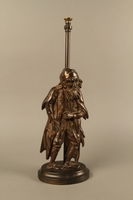
Cast iron Fagin lamp holding a toasting fork / trident
Object
Cast iron lamp in the shape of Fagin, a Jewish criminal from the novel, Oliver Twist, by Charles Dickens, 1837-39. He holds a trident, referencing the toasting fork Fagin uses in the novel. He is called devil-like and often portrayed with a trident shaped toasting fork to emphasize this connection. His characterization is antisemitic and exploits many negative stereotypes. Referred to as The Jew, Fagin is introduced as "villainous and repulsive." His nails are black, his few teeth are fangs, he is greedy, vicious, and kidnaps small children to make them thieves. Dickens rationalized it by saying that if he had a character who was a fence for stolen goods, he had to be a Jew because "that class of criminal almost invariably was a Jew." Many adaptations try to sidestep the complications of Fagin's ethnic identity, and make him more of a comic figure, but the unpleasant Jewish stereotypes are central to his depiction. This lamp base is one of the more than 900 items in the Katz Ehrenthal Collection of antisemitic artifacts and visual materials.
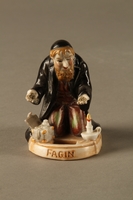
Porcelain figure of Fagin counting his money by candlelight
Object
Small, porcelain figurine portraying a scene from “Oliver Twist,” where Fagin is going through his box of stolen goods. In the scene, Fagin, who is repeatedly referred to as “the Jew,” is delighted that his previous partners in crime were executed, allowing him to keep the valuables for himself. Fagin is wearing a skull cap, and is portrayed with red hair, a beard, and a large nose; all stereotypical physical features attributed to Jewish men. In “Oliver Twist,” Fagin is the villainous leader of a gang of children whom he has instructed in the ways of criminality. He attempts to corrupt the protagonist, Oliver, in the same manner. In the novel, Fagin is described in his first scene as hunched over a fire holding a toasting fork, imagery that reinforces the antisemitic stereotype of Jewish associations with the devil, due to its resemblance of a pitchfork. He is repeatedly referred to as “the Jew” in the book and also emphasized as a greedy, miserly, and cowardly character; all traits aligning with common antisemitic stereotypes. However, in a later edition of the novel, Dickens reduced his use of “the Jew,” substituting it for pronouns or other phrases. Even in this later version, Fagin is still repeatedly and negatively referred to as “the Jew,” and remains emblematic of multiple antisemitic canards. Later writings by Dickens portrayed Jews in a more positive light, however, the reprehensible Fagin is his most remembered Jewish character. This figurine is one of the more than 900 items in the Katz Ehrenthal Collection of antisemitic artifacts and visual materials.
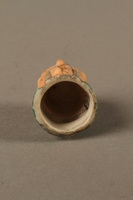
Porcelain thimble in the shape of Fagin's head
Object
Porcelain thimble in the shape of a small bust, depicting the head of Fagin, a character from Charles Dickens’ novel, “Oliver Twist.” It was manufactured by Harmer Sculptures in Staffordshire, England, likely during the 1980s. Fagin is portrayed with a beard, sidelocks, a large nose, and thick eyebrows; all stereotypical physical features attributed to Jewish men. In “Oliver Twist,” Fagin is the villainous leader of a gang of children whom he has instructed in the ways of criminality. He attempts to corrupt the protagonist, Oliver, in the same manner. In the novel, Fagin is described in his first scene as hunched over a fire holding a toasting fork, imagery that reinforces the antisemitic stereotype of Jewish associations with the devil, due to its resemblance of a pitchfork. He is repeatedly referred to as “the Jew” in the book and also emphasized as a greedy, miserly, and cowardly character; all traits aligning with common antisemitic stereotypes. However, in a later edition of the novel, Dickens reduced his use of “the Jew,” substituting it for pronouns or other phrases. Even in this later version, Fagin is still repeatedly and negatively referred to as “the Jew,” and remains emblematic of multiple antisemitic canards. Later writings by Dickens portrayed Jews in a more positive light, however, the reprehensible Fagin is his most remembered Jewish character. This thimble is one of the more than 900 items in the Katz Ehrenthal Collection of antisemitic artifacts and visual materials.

Frosted drinking glass with a painted image of Fagin
Object
Frosted glass cup with a painted scene of Oliver’s first encounter with Fagin, from Charles Dickens’ novel, “Oliver Twist.” The cup is part of a set painted with scenes from the works of Charles Dickens. The set is commonly associated with 20th-century glass manufacturers, Federal Glass and Hazel-Atlas Glass Company. Fagin is portrayed with a beard, a large nose, and thick eyebrows; all stereotypical physical features attributed to Jewish men. In “Oliver Twist,” Fagin is the villainous leader of a gang of children whom he has instructed in the ways of criminality. He attempts to corrupt the protagonist, Oliver, in the same manner. In the novel, Fagin is described in his first scene as hunched over a fire holding a toasting fork, imagery that reinforces the antisemitic stereotype of Jewish associations with the devil, due to its resemblance of a pitchfork. He is repeatedly referred to as “the Jew” in the book and also emphasized as a greedy, miserly, and cowardly character; all traits aligning with common antisemitic stereotypes. However, in a later edition of the novel, Dickens reduced his use of “the Jew,” substituting it for pronouns or other phrases. Even in this later version, Fagin is still repeatedly and negatively referred to as “the Jew,” and remains emblematic of multiple antisemitic canards. Later writings by Dickens portrayed Jews in a more positive light, however, the reprehensible Fagin is his most remembered Jewish character. This glass is one of the more than 900 items in the Katz Ehrenthal Collection of antisemitic artifacts and visual materials.
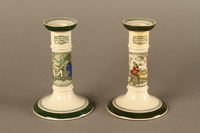
Pair of William Adams & Sons stoneware candlesticks with a scene of Oliver Twist meeting Fagin
Object
Pair of candlesticks (a and b) decorated with two colored illustrations from popular Charles Dickens’ books, manufactured by William Adams & Sons, likely between 1896 and 1920. The first image is from “Old Curiosity Shop,” and was originally drawn by Hablot Knight Browne (aka Phiz). The image was first published in 1840, with the serialized release of the story. However, the caption is from a later illustration of the same scene by Charles Green, and was first published in a later edition of the novel in 1876. The second image is from “Oliver Twist,” and was originally drawn by George Cruikshank. It was first originally published in 1837, with the serialized release of the story. Fagin is portrayed with a beard and a large nose; both stereotypical physical features attributed to Jewish men. In “Oliver Twist,” Fagin is the villainous leader of a gang of children whom he has instructed in the ways of criminality. He attempts to corrupt the protagonist, Oliver, in the same manner. In the novel, Fagin is described in his first appearance as hunched over a fire holding a toasting fork. This imagery reinforces the antisemitic stereotype of Jewish associations with the devil, due to the toasting fork’s resemblance of a pitchfork. He is repeatedly referred to as “the Jew” in the book and also emphasized as a greedy, miserly, and cowardly character; all traits aligning with common antisemitic stereotypes. However, in a later edition of the novel, Dickens reduced his use of “the Jew,” substituting it for pronouns or other phrases. Even in this later version, Fagin is still repeatedly and negatively referred to as “the Jew,” and remains emblematic of multiple antisemitic canards. Later writings by Dickens portrayed Jews in a more positive light, however, the reprehensible Fagin is his most remembered Jewish character. These candlesticks are two of the more than 900 items in the Katz Ehrenthal Collection of antisemitic artifacts and visual materials.
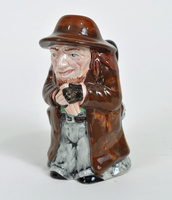
Character jug of Fagin wringing his hands
Object
Toby jug depicting Fagin wringing his hands, made by Manor (Manor ware) in England. Although the markings identify it as a character jug, its design is more similar to that of a Toby jug. Toby jugs were first made in the mid-18th century and are ceramic pitchers usually modeled on full-bodied representations of popular characters. Character jugs usually only feature the head and shoulders. Fagin is portrayed with red hair, a beard, a large nose, thick eyebrows, and hooded eyes; all stereotypical physical features attributed to Jewish men. In “Oliver Twist,” Fagin is the villainous leader of a gang of children whom he has instructed in the ways of criminality. He attempts to corrupt the protagonist, Oliver, in the same manner. In the novel, Fagin is described in his first scene as hunched over a fire holding a toasting fork, imagery that reinforces the antisemitic stereotype of Jewish associations with the devil, due to the toasting fork's resemblance of a pitchfork. He is repeatedly referred to as “the Jew” in the book and also emphasized as a greedy, miserly, and cowardly character; all traits aligning with common antisemitic stereotypes. However, in a later edition of the novel, Dickens reduced his use of “the Jew,” substituting it for pronouns or other phrases. Even in this later version, Fagin is still repeatedly and negatively referred to as “the Jew,” and remains emblematic of multiple antisemitic canards. Later writings by Dickens portrayed Jews in a more positive light, however, the reprehensible Fagin is his most remembered Jewish character. This pitcher is one of the more than 900 items in the Katz Ehrenthal Collection of antisemitic artifacts and visual materials.
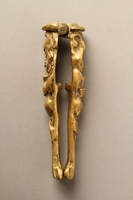
Brass nutcracker with a Fagin shaped handle
Object
Brass lever nutcracker cast in the shape of Fagin holding a money bag. This style and similar nutcrackers were mass produced for a long period by the Pearson-Page brass company in England, under several names. Fagin is a devil-like Jewish criminal from the novel, Oliver Twist, by Charles Dickens, 1837-39. The characterization is antisemitic and exploits many negative stereotypes. Referred to as The Jew, Fagin is villainous, greedy and repulsive, with black nails and fangs for teeth, and kidnaps small children to make them thieves. Dickens shared a common prejudice of the day, saying that if he had a character who was a fence, he had to be a Jew because "that class of criminal almost invariably was a Jew." Many adaptations try to sidestep Fagin's ethnic identity, or make him more of a comic figure, but his Jewishness is central to his depiction. This nutcracker is one of the more than 900 items in the Katz Ehrenthal Collection of antisemitic artifacts and visual materials.
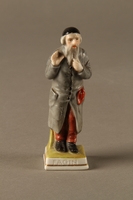
Porcelain figurine of a rosy cheeked Fagin
Object
Small, ceramic figurine of Fagin, a character from Charles Dickens’ novel, “Oliver Twist.” Fagin is portrayed with a long beard, a large nose, thick eyebrows, and hooded eyes; all stereotypical physical features attributed to Jewish men. In “Oliver Twist,” Fagin is the villainous leader of a gang of children whom he has instructed in the ways of criminality. He attempts to corrupt the protagonist, Oliver, in the same manner. In the novel, Fagin is described in his first scene as hunched over a fire holding a toasting fork, imagery that reinforces the antisemitic stereotype of Jewish associations with the devil, due to its resemblance of a pitchfork. He is repeatedly referred to as “the Jew” in the book and also emphasized as a greedy, miserly, and cowardly character; all traits aligning with common antisemitic stereotypes. However, in a later edition of the novel, Dickens reduced his use of “the Jew,” substituting it for pronouns or other phrases. Even in this later version, Fagin is still repeatedly and negatively referred to as “the Jew,” and remains emblematic of multiple antisemitic canards. Later writings by Dickens portrayed Jews in a more positive light, however, the reprehensible Fagin is his most remembered Jewish character. This figurine is one of the more than 900 items in the Katz Ehrenthal Collection of antisemitic artifacts and visual materials.
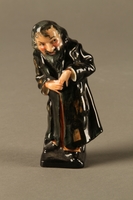
Royal Doulton ceramic figurine of Fagin dressed in black
Object
Dickens Ware series figurine of Fagin, designed by Leslie Harradine, and made by Royal Doulton in England, likely in the 1920s or 1930s. Royal Doulton is an English ceramic manufacturer that specializes in artistically styled and decorated ceramics and tableware. In 1908, Royal Doulton introduced the Dickens Ware series, based on Charles Dickens’ characters, which was originally produced until 1937. A second run of the series was produced mid-century. Fagin is portrayed with a beard and a large nose; both stereotypical physical features attributed to Jewish men. In “Oliver Twist,” Fagin is the villainous leader of a gang of children whom he has instructed in the ways of criminality. He attempts to corrupt the protagonist, Oliver, in the same manner. In the novel, Fagin is described in his first scene as hunched over a fire holding a toasting fork, imagery that reinforces the antisemitic stereotype of Jewish associations with the devil, due to its resemblance of a pitchfork. He is repeatedly referred to as “the Jew” in the book and also emphasized as a greedy, miserly, and cowardly character; all traits aligning with common antisemitic stereotypes. However, in a later edition of the novel, Dickens reduced his use of “the Jew,” substituting it for pronouns or other phrases. Even in this later version, Fagin is still repeatedly and negatively referred to as “the Jew,” and remains emblematic of multiple antisemitic canards. Later writings by Dickens portrayed Jews in a more positive light, however, the reprehensible Fagin is his most remembered Jewish character. This figurine is one of the more than 900 items in the Katz Ehrenthal Collection of antisemitic artifacts and visual materials.
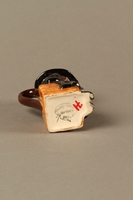
Character jug of Fagin sitting on a box
Object
Toby jug depicting Fagin sitting on a box, made by Artone in Burslem, England. Artone was a small company founded in 1946, which specialized in hand-painted bone china. Toby jugs were first made in the mid-18th century and are ceramic pitchers usually modeled on full-bodied representations of popular characters. Character jugs usually only feature the head and shoulders. Fagin is portrayed with a long beard, a large nose, and thick eyebrows; all stereotypical physical features attributed to Jewish men. In “Oliver Twist,” Fagin is the villainous leader of a gang of children whom he has instructed in the ways of criminality. He attempts to corrupt the protagonist, Oliver, in the same manner. In the novel, Fagin is described in his first scene as hunched over a fire holding a toasting fork, imagery that reinforces the antisemitic stereotype of Jewish associations with the devil, due to its resemblance of a pitchfork. He is repeatedly referred to as “the Jew” in the book and also emphasized as a greedy, miserly, and cowardly character; all traits aligning with common antisemitic stereotypes. However, in a later edition of the novel, Dickens reduced his use of “the Jew,” substituting it for pronouns or other phrases. Even in this later version, Fagin is still repeatedly and negatively referred to as “the Jew,” and remains emblematic of multiple antisemitic canards. Later writings by Dickens portrayed Jews in a more positive light, however, the reprehensible Fagin is his most remembered Jewish character. This pitcher is one of the more than 900 items in the Katz Ehrenthal Collection of antisemitic artifacts and visual materials.

Royal Doulton Dickens Ware teapot decorated with an image of Fagin
Object
Dickens Ware series teapot featuring an image of Fagin, made by Royal Doulton in England during the 20th century. Royal Doulton is an English ceramic manufacturer that specializes in artistically styled and decorated ceramics and tableware. In 1889, Charles Noke joined the company. He later introduced Doulton Series Ware, plates and other items with decorations based on characters from popular culture. In 1908, Royal Doulton introduced the Dickens Ware series, based on Charles Dickens’ characters. The series was originally produced until 1937, and a second run of the series was produced mid-century. On the teapot, Fagin is portrayed with a beard and a large nose; both stereotypical physical features attributed to Jewish men. In “Oliver Twist,” Fagin is the villainous leader of a gang of children whom he has instructed in the ways of criminality. He attempts to corrupt the protagonist, Oliver, in the same manner. In the novel, Fagin is described in his first scene as hunched over a fire holding a toasting fork. This imagery reinforces the antisemitic stereotype of Jewish associations with the devil due to the toasting fork’s resemblance of a pitchfork. He is repeatedly referred to as “the Jew” in the book and also emphasized as a greedy, miserly, and cowardly character; all traits aligning with common antisemitic stereotypes. However, in a later editionof the novel, Dickens reduced his use of “the Jew,” substituting it for pronouns or other phrases. However, even in this later version, Fagin is still repeatedly and negatively referred to as “the Jew,” and remains emblematic of multiple antisemitic canards. Later writings by Dickens portrayed Jews in a more positive light, however, the reprehensible Fagin is his most remembered Jewish character. This teapot is one of the more than 900 items in the Katz Ehrenthal Collection of antisemitic artifacts and visual materials.
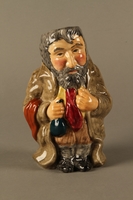
Roy Kirkham Toby jug of Fagin holding a coin bag
Object
Toby jug depicting Fagin holding a small coin bag made by Roy Kirkham & Co. Limited in Staffordshire, England, during the latter half of the 20th century. Roy Kirkham started his self-named company in the 1970s, producing character and Toby jugs, figurines, and later, fine bone china. Toby jugs were first made in the mid-18th century and are ceramic pitchers usually modeled on full-bodied representations of popular characters while character jugs usually only feature the head and shoulders. Fagin is portrayed with a beard, a large nose, and thick eyebrows; all stereotypical physical features attributed to Jewish men. In “Oliver Twist,” Fagin is the villainous leader of a gang of children whom he has instructed in the ways of criminality. He attempts to corrupt the protagonist, Oliver, in the same manner. In the novel, Fagin is described in his first scene as hunched over a fire holding a toasting fork, imagery that reinforces the antisemitic stereotype of Jewish associations with the devil, due to its resemblance of a pitchfork. He is repeatedly referred to as “the Jew” in the book and also emphasized as a greedy, miserly, and cowardly character; all traits aligning with common antisemitic stereotypes. However, in a later edition of the novel, Dickens reduced his use of “the Jew,” substituting it for pronouns or other phrases. Even in this later version, Fagin is still repeatedly and negatively referred to as “the Jew,” and remains emblematic of multiple antisemitic canards. Later writings by Dickens portrayed Jews in a more positive light, however, the reprehensible Fagin is his most remembered Jewish character.
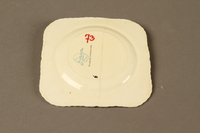
Alfred Meakin plate with an image of Fagin
Object
Van Dyck Ware Dickens Characters plate made by Alfred Meakin in England, likely in the 1920s or 1930s. The Alfred Meakin company operated in England from 1875 until 1976, when it was acquired by another company. On the plate, Fagin is portrayed with a beard and a large nose; both stereotypical physical features attributed to Jewish men. In “Oliver Twist,” Fagin is the villainous leader of a gang of children whom he has instructed in the ways of criminality. He attempts to corrupt the protagonist, Oliver, in the same manner. In the novel, Fagin is described in his first scene as hunched over a fire holding a toasting fork. This imagery reinforces the antisemitic stereotype of Jewish associations with the devil, due to the toasting fork’s resemblance of a pitchfork. He is repeatedly referred to as “the Jew” in the book and also emphasized as a greedy, miserly, and cowardly character; all traits aligning with common antisemitic stereotypes. However, in a later edition of the novel, Dickens reduced his use of “the Jew,” substituting it for pronouns or other phrases. Even in this later version, Fagin is still repeatedly and negatively referred to as “the Jew,” and remains emblematic of multiple antisemitic canards. Later writings by Dickens portrayed Jews in a more positive light, however, the reprehensible Fagin is his most remembered Jewish character. This plate is one of the more than 900 items in the Katz Ehrenthal Collection of antisemitic artifacts and visual materials.
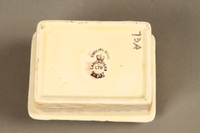
Ceramic box with an image of Fagin
Object
Ceramic box with a lid featuring an image of Fagin’s head made in England by Lancasters Ltd., likely in the first half of the 20th century. The company produced pottery in England from 1896 until 1968, under several different names. On the lid, Fagin is portrayed with a beard and a large nose; both stereotypical physical features attributed to Jewish men. In “Oliver Twist,” Fagin is the villainous leader of a gang of children whom he has instructed in the ways of criminality. He attempts to corrupt the protagonist, Oliver, in the same manner. In the novel, Fagin is described in his first scene as hunched over a fire holding a toasting fork. This imagery reinforces the antisemitic stereotype of Jewish associations with the devil, due to the toasting fork’s resemblance of a pitchfork. He is repeatedly referred to as “the Jew” in the book and also emphasized as a greedy, miserly, and cowardly character; all traits aligning with common antisemitic stereotypes. However, in a later edition of the novel, Dickens reduced his use of “the Jew,” substituting it for pronouns or other phrases. Even in this later version, Fagin is still repeatedly and negatively referred to as “the Jew,” and remains emblematic of multiple antisemitic canards. Later writings by Dickens portrayed Jews in a more positive light, however, the reprehensible Fagin is his most remembered Jewish character. This ceramic box is one of the more than 900 items in the Katz Ehrenthal Collection of antisemitic artifacts and visual materials.
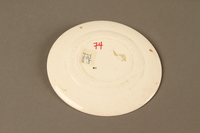
Cartwright and Edwards plate decorated with a scene from Oliver Twist
Object
Plate made by Cartwright and Edwards, likely during the early 20th century, and decorated with a scene from Charles Dickens’ novel, Oliver Twist. The depicted scene is Oliver’s introduction to Fagin by the Artful Dodger. Cartwright & Edwards was an English earthenware and china manufacturer in operation from 1857 until 1990. On the plate, Fagin is portrayed with a beard, a large nose and a skullcap; all stereotypical physical features attributed to Jewish men. In “Oliver Twist,” Fagin is the villainous leader of a gang of children whom he has instructed in the ways of criminality. He attempts to corrupt the protagonist, Oliver, in the same manner. In the novel, Fagin is described in his first scene as hunched over a fire holding a toasting fork. This imagery reinforces the antisemitic stereotype of Jewish associations with the devil, due to the toasting fork’s resemblance of a pitchfork. He is repeatedly referred to as “the Jew” in the book and also emphasized as a greedy, miserly, and cowardly character; all traits aligning with common antisemitic stereotypes. However, in a later edition of the novel, Dickens reduced his use of “the Jew,” substituting it for pronouns or other phrases. Even in this later version, Fagin is still repeatedly and negatively referred to as “the Jew,” and remains emblematic of multiple antisemitic canards. Later writings by Dickens portrayed Jews in a more positive light, however, the reprehensible Fagin is his most remembered Jewish character. This plate is one of the more than 900 items in the Katz Ehrenthal Collection of antisemitic artifacts and visual materials.

Avon Ware Fagin Character jug
Object
Avon Ware character mug made in England, likely in the 20th century, and modeled after Fagin, a character from Charles Dickens' novel, Oliver Twist. Character jugs are ceramic pitchers usually modeled on the head and shoulders of popular characters. They are similar to Toby jugs, which are pitchers modeled on full-bodied representations of popular characters. On the jug, Fagin is portrayed with a beard, a large nose, thick eyebrows, and hooded eyes; all stereotypical physical features attributed to Jewish men. In “Oliver Twist,” Fagin is the villainous leader of a gang of children whom he has instructed in the ways of criminality. He attempts to corrupt the protagonist, Oliver, in the same manner. In the novel, Fagin is described in his first scene as hunched over a fire holding a toasting fork. This imagery reinforces the antisemitic stereotype of Jewish associations with the devil, due to the toasting fork’s resemblance of a pitchfork. He is repeatedly referred to as “the Jew” in the book and also emphasized as a greedy, miserly, and cowardly character; all traits aligning with common antisemitic stereotypes. However, in a later edition of the novel, Dickens reduced his use of “the Jew,” substituting it for pronouns or other phrases. Even in this later version, Fagin is still repeatedly and negatively referred to as “the Jew,” and remains emblematic of multiple antisemitic canards. Later writings by Dickens portrayed Jews in a more positive light, however, the reprehensible Fagin is his most remembered Jewish character. This jug is one of the more than 900 items in the Katz Ehrenthal Collection of antisemitic artifacts and visual materials.
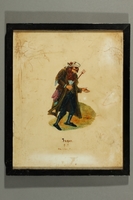
Painting on glass of Fagin with his toasting fork
Object
Painting on glass of Fagin, the devil-like Jewish character from the novel, Oliver Twist, written by Charles Dickens in 1837-8. The image is based on an 1888 illustration by Kyd (Joseph Clayton Clarke.) The characterization is antisemitic and exploits many negative stereotypes. Referred to as The Jew, Fagin is introduced as "villainous and repulsive," with black nails and fanglike teeth. He is greedy and vicious, and kidnaps small children and trains them to be thieves. Dickens rationalized the issue, saying that if he had a character who was a fence, a dealer in stolen goods, he had to be a Jew because "that class of criminal almost invariably was a Jew." Later adaptations of the novel tried to sidestep the complications of Fagin's ethnic identity, or make him more of a comic figure, but his stereotypical Jewish traits are central to his depiction. This painting on glass is one of the more than 900 items in the Katz Ehrenthal Collection of antisemitic artifacts and visual materials.
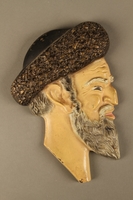
Painted metal wall bust of a sneering Jewish man in a shtreimel
Object
Bas relief wall plaque of a Jewish man in a shtreimel, a cloth hat with fur trim often worn by Eastern European Orthodox Jews in the 19th-early 20th century. The figure is marked Fagin on the back, but this portrait does not resemble descriptions of that character from the novel Oliver Twist, 1838-1839, by Charles Dickens, although it may have been marketed that way. Caricatures of Jewish figures were commonly used to decorate everyday items, such as ceramics, toys, walking sticks, and cork stoppers, examples of racial antisemitism becoming part of everyday life. This bas-relief plaque is one of the more than 900 items in the Katz Ehrenthal Collection of antisemitic artifacts and visual materials.
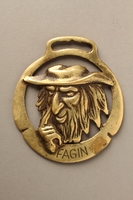
Brass horse medallion with Fagin touching his finger to his nose
Object
Cast horse brass with an image of Fagin touching his finger to his nose. These medallions were popular decorations for the harnesses of working horses, especially in the mid-19th century. As horses ceased to be used for many tasks in the 20th century, the brasses were used as wall decorations and were popular souvenirs. Fagin is a devil-like Jewish criminal from the novel, Oliver Twist, by Charles Dickens, 1837-39. The novel's characterization is antisemitic and exploits many negative stereotypes. Referred to as The Jew, Fagin is villainous, greedy, and repulsive, with black nails, fanglike teeth, and he kidnaps small children to make them thieves. Dickens shared a common prejudice of the time, saying that if he had a character who was a fence, he had to be a Jew because "that class of criminal almost invariably was a Jew." Many adaptations try to sidestep the complications of Fagin's ethnic identity, or make him more of a comic figure, but his Jewishness is central to his depiction. This ornament is one of the more than 900 items in the Katz Ehrenthal Collection of antisemitic artifacts and visual materials.
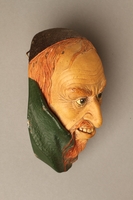
Bossons chalkware wall decoration of Fagin's head
Object
Chalkware wall decoration in the shape of a small bust depicting the head of Fagin, a character from Charles Dickens’ novel, “Oliver Twist.” It was designed by Fred Wright and manufactured by W.H. Bossons Ltd. in Congleton, England, between 1964 and 1988. The company manufactured ceramic and plaster goods from 1948 until 1996. Fagin is portrayed with a beard, red hair, and a large nose; all stereotypical physical features attributed to Jewish men. In “Oliver Twist,” Fagin is the villainous leader of a gang of children whom he has instructed in the ways of criminality. He attempts to corrupt the protagonist, Oliver, in the same manner. In the novel, Fagin is described in his first scene as hunched over a fire holding a toasting fork. This imagery reinforces the antisemitic stereotype of Jewish associations with the devil, due to the toasting fork’s resemblance of a pitchfork. He is repeatedly referred to as “the Jew” in the book and also emphasized as a greedy, miserly, and cowardly character; all traits aligning with common antisemitic stereotypes. However, in a later edition of the novel, Dickens reduced his use of “the Jew,” substituting it for pronouns or other phrases. Even in this later version, Fagin is still repeatedly and negatively referred to as “the Jew,” and remains emblematic of multiple antisemitic canards. Later writings by Dickens portrayed Jews in a more positive light, however, the reprehensible Fagin is his most remembered Jewish character. This wall decoration is one of the more than 900 items in the Katz Ehrenthal Collection of antisemitic artifacts and visual materials.
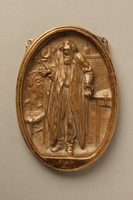
Bronze plaque with a full length image of Fagin
Object
Cast bronze plaque of Fagin, a devil-like Jewish criminal from the novel, Oliver Twist, by Charles Dickens, 1837-39. Plaques of the same shape, size, and design were mass produced in England in 1910 in an inexpensive material known as Ivorex, plaster of Paris dipped in wax. The metal version may have been produced earlier, but the source is not known. Fagin's characterization is antisemitic and exploits many negative stereotypes. Referred to as The Jew, Fagin is villainous, greedy, and repulsive, with black nails, fanglike teeth, and he kidnaps small children to make them thieves. Dickens shared a common prejudice of the time, saying that if he had a character who was a fence, he had to be a Jew because "that class of criminal almost invariably was a Jew." Many adaptations try to sidestep the complications of Fagin's ethnic identity, or make him more of a comic figure, but his Jewishness is central to his depiction. This ornament is one of the more than 900 items in the Katz Ehrenthal Collection of antisemitic artifacts and visual materials.
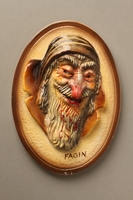
Painted ceramic wall plaque of a grinning Fagin
Object
Oval-shaped wall plaque with a relief image of Fagin, a character from the Charles Dickens’ novel, “Oliver Twist,” possibly from the early 20th century. On the plaque, Fagin is portrayed with a beard, sidelocks, hooded eyes, thick eyebrows, and a large nose; all stereotypical physical features attributed to Jewish men. His mouth and beard are painted a crimson red, resembling blood, possibly to represent blood libel, antisemitic allegations that accused Jews of murdering Christian children to consume their blood. In “Oliver Twist,” Fagin is the villainous leader of a gang of children whom he has instructed in the ways of criminality. He attempts to corrupt the protagonist, Oliver, in the same manner. In the novel, Fagin is described in his first scene as hunched over a fire holding a toasting fork. This imagery reinforces the antisemitic stereotype of Jewish associations with the devil, due to the toasting fork’s resemblance of a pitchfork. He is repeatedly referred to as “the Jew” in the book and also emphasized as a greedy, miserly, and cowardly character; all traits aligning with common antisemitic stereotypes. However, in a later edition of the novel, Dickens reduced his use of “the Jew,” substituting it for pronouns or other phrases. Even in this later version, Fagin is still repeatedly and negatively referred to as “the Jew,” and remains emblematic of multiple antisemitic canards. Later writings by Dickens portrayed Jews in a more positive light, however, the reprehensible Fagin is his most remembered Jewish character. This plaque is one of the more than 900 items in the Katz Ehrenthal Collection of antisemitic artifacts and visual materials.
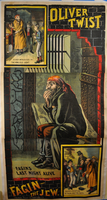
Advertising poster for a theatrical production of Oliver Twist
Object
Large, woodblock-printed advertising poster for a theatrical production of Charles Dickens’ “Oliver Twist,” printed by Calhoun Printing Company in Hartford, Connecticut. The poster features three images, all based on the illustrations by George Cruikshank, which were originally published in the novel’s serialized form between 1837 and 1839. On the poster, Fagin is portrayed with a beard, thick eyebrows and a large nose; all stereotypical physical features attributed to Jewish men. In “Oliver Twist,” Fagin is the villainous leader of a gang of children whom he has instructed in the ways of criminality. He attempts to corrupt the protagonist, Oliver, in the same manner. In the novel, Fagin is described in his first scene as hunched over a fire holding a toasting fork. This imagery reinforces the antisemitic stereotype of Jewish associations with the devil, due to the toasting fork’s resemblance of a pitchfork. He is repeatedly referred to as “the Jew” in the book and also emphasized as a greedy, miserly, and cowardly character; all traits aligning with common antisemitic stereotypes. However, in a later edition of the novel, Dickens reduced his use of “the Jew,” substituting it for pronouns or other phrases. Even in this later version, Fagin is still repeatedly and negatively referred to as “the Jew,” and remains emblematic of multiple antisemitic canards. Later writings by Dickens portrayed Jews in a more positive light, however, the reprehensible Fagin is his most remembered Jewish character. This poster is one of the more than 900 items in the Katz Ehrenthal Collection of antisemitic artifacts and visual materials.
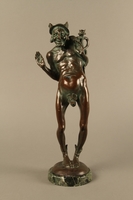
Bronze statue of a Jewish man as the pagan god Mercury
Object
Bronze sculpture by Bruno Zach of the pagan deity Mercury as an offensively buffoonish Jewish man. The antisemitic intent of the work is not limited to the loathsome physical depiction. By making the Jewish man in the image of Mercury, the depiction merged Jewish identity with a practice it condemned, idol worship. Mercury was frequently used to symbolize idolatry in rabbinical literature. Mercury was the Roman god of merchants and travellers, as well as thieves, and his caduceus was originally a magical wand used for incantations and alchemy. These were all professions - commerce, peddling, theft, and alchemy, with which Jews were associated in longheld stereotypes. Zach (1891-1935) was a popular sculptor, best known for his erotica, in early 20th century Vienna, Austria, where antisemitism was widespread and openly expressed, and a popular cause for many political parties. This sculpture is one of the more than 900 items in the Katz Ehrenthal Collection of antisemitic artifacts and visual materials.
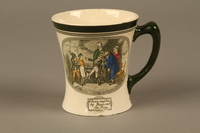
William Adams & Sons porcelain mug with a scene of Oliver Twist meeting Fagin
Object
Porcelain mug decorated with two colored illustrations from popular Charles Dickens’ books, manufactured by William Adams & Sons, likely between 1896 and 1920. The image on the back of the mug is from “Old Curiosity Shop,” and was originally drawn by Hablot Knight Browne (aka Phiz). The image was first published in 1840, with the serialized release of the story. However, the caption is from a later illustration of the same scene by Charles Green, and first published in a later edition of the novel in 1876. The image on the front of the mug is from “Oliver Twist,” and was originally drawn by George Cruikshank. It was first published in 1837, with the serialized release of the story. Fagin is portrayed with a beard and a large nose; both stereotypical physical features attributed to Jewish men. In “Oliver Twist,” Fagin is the villainous leader of a gang of children whom he has instructed in the ways of criminality. He attempts to corrupt the protagonist, Oliver, in the same manner. In the novel, Fagin is described in his first appearance as hunched over a fire holding a toasting fork. This imagery reinforces the antisemitic stereotype of Jewish associations with the devil, due to the toasting fork’s resemblance of a pitchfork. He is repeatedly referred to as “the Jew” in the book and also emphasized as a greedy, miserly, and cowardly character; all traits aligning with common antisemitic stereotypes. However, in a later edition of the novel, Dickens reduced his use of “the Jew,” substituting it for pronouns or other phrases. Even in this later version, Fagin is still repeatedly and negatively referred to as “the Jew,” and remains emblematic of multiple antisemitic canards. Later writings by Dickens portrayed Jews in a more positive light, however, the reprehensible Fagin is his most remembered Jewish character. This mug is one of the more than 900 items in the Katz Ehrenthal Collection of antisemitic artifacts and visual materials.
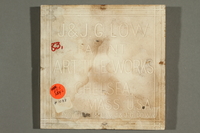
Ceramic tile with an impression of a miserly Jew holding a money bag
Object
Ceramic tile with antisemitic, Latin text and an image of a stern looking Jewish man holding a money pouch. The man is wearing a skull cap and has a large nose, and a long beard; all stereotypical physical features commonly attributed to Jewish men. The image of the man, coupled with the Latin text that translates to “never enough,” references the antisemitic myth of Jewish greed and avarice. Many antisemitic depictions of Jews show them hoarding, counting, or handling money. These stereotypes originated from the economic and professional restrictions placed on early European Jews. They were barred from owning land, farming, joining trade guilds, and military service. These restrictions forced many Jews into occupations such as money changing (exchanging foreign coins or currency for those used locally). Additionally, medieval religious belief held that charging interest (known as usury) was sinful, and the Jews who occupied these professions were looked down upon, predominantly by European Christians. They were perceived as morally deficient and willing to engage in unethical business practices. The inability of Jews to legally hold other occupations, combined with Christians’ disdain for the professions Jews were allowed to practice, helped form the canard of the greedy Jew who exploited Gentiles. This canard was often visually depicted as a Jewish man expressing an exaggerated desire for, or counting money. This tile is one of the more than 900 items in the Katz Ehrenthal Collection of antisemitic artifacts and visual materials.
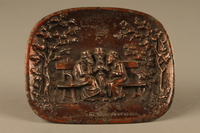
Copper painted metal dish with bas relief of 3 Jewish men on a bench
Object
Bronze dish with a bas-relief of three Jewish men talking on a bench, and captioned, “When shall we three meet again,” made in England during the 19th century. The relief represents a stereotypical scene in European spa towns such as Carlsbad (now Karlovy Vary, Czech Republic), or Marienbad (now Mariánské Lázně, Czech Republic). These are towns located on thermal springs, and have accommodations that use those springs for their medicinal and rejuvenating properties. Many European spa towns can trace their histories back to ancient Roman settlements. During the 18th and 19th centuries, European spa towns became increasingly popular as centers for health and social destinations for the affluent, the nobility, and European royalty. During this time, seemingly large numbers of Jewish guests also frequented the spa towns. However, antisemitic sentiment was also present. Derogatory postcards, called Judenspottkarten [Jew-mocking cards], and other souvenirs were produced and sold. A commonly depicted scene on these items includes a portrayal of three, usually older Jewish men, sitting on a bench sometimes with their umbrellas. The scene is possibly a modernized version of an older theme of three Jewish peddlers. Some versions replace the men with pigs who display stereotypical Jewish physical features, which mocked both Jewish spa culture and Judaism. This souvenir dish is one of the more than 900 items in the Katz Ehrenthal Collection of antisemitic artifacts and visual materials.
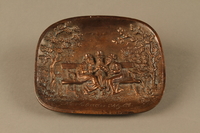
Bronze dish with bas relief of 3 Jewish men on a bench
Object
Bronze dish with a bas-relief of three Jewish men talking on a bench, captioned, “Karlsbader Idyll,” made in Bohemia during the 19th century. The relief represents a stereotypical scene in spa towns such as Carlsbad (now Karlovy Vary, Czech Republic), or Marienbad (now Mariánské Lázně, Czech Republic). These are towns located on thermal springs, and have accommodations that use those springs for their medicinal and rejuvenating properties. Many European spa towns can trace their histories back to ancient Roman settlements. During the 18th and 19th centuries, European spa towns became increasingly popular as centers for health and social destinations for the affluent, the nobility, and European royalty. During this time, a seemingly large numbers of Jewish guests also frequented the spa towns. Carlsbad previously had a prohibition against Jewish residency that was repealed in 1793. After the repeal, another fifty years of litigation attempted to keep Jews from moving into the town. However, in approximately 1848, Jews began to settle in Carlsbad even though antisemitic sentiment was still present. Derogatory postcards, called Judenspottkarten (Jew-mocking cards), and other souvenirs were produced and sold. A commonly depicted scene on these items includes a portrayal of three, usually older Jewish men, sitting on a bench sometimes with their umbrellas. The scene is possibly a modernized version of an older theme of three Jewish peddlers. Some versions replace the men with pigs who display stereotypical Jewish physical features, which mocked both Jewish spa culture and Judaism. This souvenir dish is one of the more than 900 items in the Katz Ehrenthal Collection of antisemitic artifacts and visual materials.
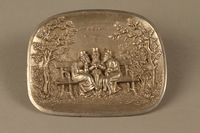
Silver colored iron dish with bas relief of 3 Jewish men on a bench
Object
European cast iron dish with a bas-relief of three Jewish men talking on a bench, captioned with three Jewish sounding surnames, “Mandelblüh, Afterduft, Finkelstein” made in the 19th century. The second name, Afterdruft, translates roughly to “fecal smell.” In the 18th and early 19th centuries, central and eastern European Jews were compelled to adopt surnames. Some Jews who did not comply, had low social status, or did not have the funds to pay an official for a pleasant-sounding name, were assigned uncomplimentary, malicious, or antisemitic names. The relief represents a stereotypical scene in European spa towns such as Carlsbad (now Karlovy Vary, Czech Republic), or Marienbad (now Mariánské Lázně, Czech Republic). These are towns located on thermal springs, and have accommodations that use those springs for their medicinal and rejuvenating properties. Many European spa towns can trace their histories back to ancient Roman settlements. During the 18th and 19th centuries, European spa towns became increasingly popular as centers for health and social destinations for the affluent, the nobility, and European royalty. During this time, seemingly large numbers of Jewish guests also frequented the spa towns. However, antisemitic sentiment was also present. Derogatory postcards, called Judenspottkarten [Jew-mocking cards], and other souvenirs were produced and sold. A commonly depicted scene on these items includes a portrayal of three, usually older Jewish men, sitting on a bench sometimes with their umbrellas. The scene is possibly a modernized version of an older theme of three Jewish peddlers. Some versions replace the men with pigs who display stereotypical Jewish physical features, which mocked both Jewish spa culture and Judaism. This souvenir dish is one of the more than 900 items in the Katz Ehrenthal Collection of antisemitic artifacts and visual materials.
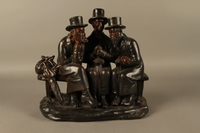
Hand painted metal figure group of 3 Jews on a bench with their umbrellas
Object
This statue is one of the more than 900 items in the Katz Ehrenthal Collection of antisemitic artifacts and visual materials.
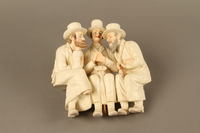
White painted white ceramic group of 3 Jews on a bench with their umbrellas
Object
This statue is one of the more than 900 items in the Katz Ehrenthal Collection of antisemitic artifacts and visual materials.
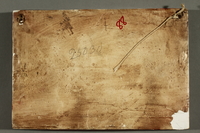
Hand painted ceramic relief of 3 Jews on a bench with their umbrellas
Object
This bas-relief is one of the more than 900 items in the Katz Ehrenthal Collection of antisemitic artifacts and visual materials.

Porcelain tobacco jar with lid shaped as the head of a Jew
Object
This tobacco jar with lid is one of the more than 900 items in the Katz Ehrenthal Collection of antisemitic artifacts and visual materials.
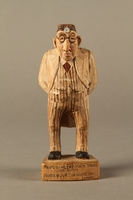
Carved wooden figure of a Jewish doctor in white coat and head mirror
Object
Contemporary, carved and painted wooden figure of a Jewish physician from Warsaw, Poland. It has a German slogan burned into the pedestal. This statue is one of the more than 900 items in the Katz Ehrenthal Collection of antisemitic artifacts and visual materials.
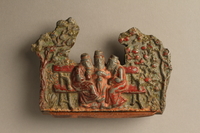
Metal doorstop with a bas relief of 3 Jews on a red bench
Object
Painted, cast metal doorstop with an image of three Jewish men talking on a bench made in the 19th century. Doorstops were an important household item in the nineteenth century. They kept doors open to ensure the circulation of air throughout the house and became fashionable decorative items. The doorstop represents a stereotypical scene in spa towns such as Carlsbad (now Karlovy Vary, Czech Republic), or Marienbad (now Mariánské Lázně, Czech Republic). These are towns located on thermal springs, and have accommodations that use those springs for their medicinal and rejuvenating properties. Many European spa towns can trace their histories back to ancient Roman settlements. During the 18th and 19th centuries, European spa towns became increasingly popular as centers for health and social destinations for the affluent, the nobility, and European royalty. During this time, seemingly large numbers of Jewish guests also frequented the spa towns. However, antisemitic sentiment was also present. Derogatory postcards, called Judenspottkarten (Jew-mocking cards), and other souvenirs were produced and sold. A commonly depicted scene on these items includes a portrayal of three, usually older Jewish men, sitting on a bench sometimes with their umbrellas. The scene is possibly a modernized version of an older theme of three Jewish peddlers. Some versions replace the men with pigs who display stereotypical Jewish physical features, which mocked both Jewish spa culture and Judaism. This doorstop is one of the more than 900 items in the Katz Ehrenthal Collection of antisemitic artifacts and visual materials.
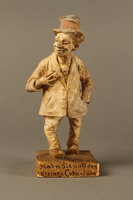
Ceramic figurine of a Jewish man with a boutonniere
Object
Ceramic figure of a stereotypical Jewish man in dilapidated top hat and suit, wearing a boutonniere. On the pedestal is the phrase: Habn Sie Nicht den Kleinen Cohn gesehn [Have you seen the little Cohn]. The text uses the name “Kleinen Cohn” (sometimes “Kleine Cohn” or “Kohn”) meaning Little Cohn, which was a pejorative term for Jews used in Germany around the turn of the twentieth century. The term is thought to have originated in an 1893 German military pamphlet. It was popularized after German humorist Guido Thielscher sang a satirical song about the character in 1902, and quickly became ubiquitous in Germany. The term, often accompanied by antisemitic images of Jews, was featured on postcards and other ephemera throughout the first decades of the twentieth century. This statue is one of the more than 900 items in the Katz Ehrenthal Collection of antisemitic artifacts and visual materials.r
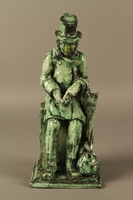
Green ceramic figurine of a Jewish peddler counting his money
Object
This figure is one of the more than 900 items in the Katz Ehrenthal Collection of antisemitic artifacts and visual materials.

Tobacco pipe with decorative wooden stand of three Jews on a bench
Object
This tobacco pipe is one of the more than 900 items in the Katz Ehrenthal Collection of antisemitic artifacts and visual materials.
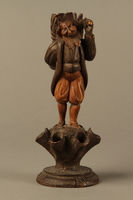
Carved cigarette and match holder of a Jewish peddler carrying a large sack
Object
This cigarette holder is one of the more than 900 items in the Katz Ehrenthal Collection of antisemitic artifacts and visual materials.
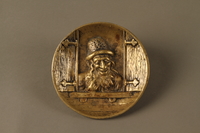
Bronze dish of a Jewish peddler at an open window
Object
Bronze-plated metal dish, possibly used as an ashtray, with a bas relief of a Jewish peddler calling at an open window. Peddlers were vendors who traveled the countryside and sold goods to the public. They usually traveled alone and carried their goods with them as they went. Peddling was a common occupation for young Jewish men during the 18th and 19th centuries. Most peddlers hoped their hard work would serve as a springboard to more lucrative and comfortable occupations. However, old prejudices formed an antisemitic stereotype of the Jewish peddler. The stereotype originated from the economic and professional restrictions placed on early European Jews. They were barred from owning land, farming, joining trade guilds, and military service. These restrictions limited Jews to the occupations of retail peddling, hawking, and moneylending. Additionally, medieval religious belief held that charging interest (known as usury) was sinful, and the Jews who occupied these professions were looked down upon, predominantly by European Christians. They were perceived as morally deficient and willing to engage in unethical business practices. The inability of Jews to legally hold other occupations, combined with Christians’ disdain for the professions Jews were allowed to practice, helped form the canard of the greedy Jew who exploited Gentiles. This canard was often visually depicted as a Jewish peddler, an untrustworthy figure that sold cut rate items at inflated prices. This dish is one of the more than 900 items in the Katz Ehrenthal Collection of antisemitic artifacts and visual materials.
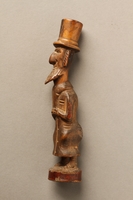
Wooden cigarette holder shaped as a Jewish peddler with a removable head
Object
This cigarette holder is one of the more than 900 items in the Katz Ehrenthal Collection of antisemitic artifacts and visual materials.
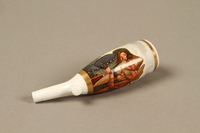
Porcelain tobacco bowl with an image of three Jewish hareskin dealers painted on the front
Object
Tobacco pipe bowl with an image of three Jewish hareskin dealers painted on the front. Bowls of this type were used with German Gesteckpfeife (arranged pipe) style tobacco pipes, also known as a Jaeger Pipes, German hunter pipes, German Porcelain pipes, Tyrolean pipes, and Wine Pipes. The tobacco was packed in the porcelain bowl which was then placed in the reservoir (or abguss) of the pipe (2016.184.115b). The reservoir acted as a retainer for the juices and tar, and sometimes wine was placed in the reservoir to flavor the smoke. This style of pipe was popular in Central Europe from the 18th to the early 20th centuries and was most commonly associated with Germanic culture. The bowls that accompanied these types of pipes were often decorated with elaborate images or coats of arms. The commonly reproduced image of three Jewish hareskin dealers was very popular in northern Europe and was reproduced in various mediums. The image depicts the Jewish men with stereotypically hooked noses, hooded eyes, beards, and pointed teeth. The scene, possibly based on a Dutch folktale about three Jewish hareskin dealers who swindle a miserly farmer, can be traced back to the lithographic printing firm of Johan Martin Billroth, which opened in 1829 in Groningen, Netherlands. This tobacco pipe bowl is one of the more than 900 items in the Katz Ehrenthal Collection of antisemitic artifacts and visual materials.
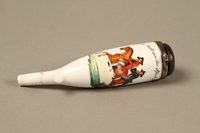
German Gesteckpfeife style tobacco pipe and porcelain bowl with an antisemitic image
Object
German Gesteckpfeife (arranged pipe) style tobacco pipe with its accompanying bowl. This style of pipe is also known as a Jaeger Pipe, German hunter pipe, German Porcelain pipe, Tyrolean pipe, and Wine Pipe. The tobacco was packed in the porcelain bowl which was then placed in the reservoir (or abguss) of the pipe. The reservoir acted as a retainer for the juices and tar, and sometimes wine was placed in the reservoir to flavor the smoke. This style of pipe was popular in Central Europe from the 18th to the early 20th centuries and was most commonly associated with Germanic culture. The bowls that accompanied these types of pipes were often decorated with elaborate images or coats of arms. The italicized text (an idiomatic phrase loosely translated as “Moses stop! The horse is exhausted”) and image on the bowl reference the stereotype that there is a problematic relationship between Jews and horses. This stereotype sought to feminize Jewish men and minimize their social status by separating them from masculine and socially respectable nineteenth century activities, such as foxhunting on horseback and military service in the cavalry. This stereotype also perpetuated the myth that Jews refused to engage in rural occupations such as farming by disassociating them with horses, a common farm animal. This tobacco pipe is one of the more than 900 items in the Katz Ehrenthal Collection of antisemitic artifacts and visual materials.
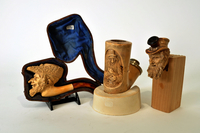
Meerschaum pipe with the bowl carved as a Jewish man's head, with case
Object
This pipe is one of the more than 900 items in the Katz Ehrenthal Collection of antisemitic artifacts and visual materials.
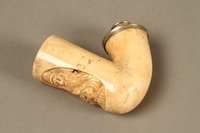
Meerschaum pipe bowl with a carved image of a Jewish man holding a pig
Object
Meerschaum pipe bowl with a carved image of a Jewish man holding a pig and a clay display mount.This pipe is one of the more than 900 items in the Katz Ehrenthal Collection of antisemitic artifacts and visual materials.
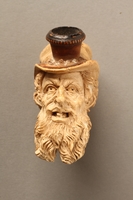
Ivory cigarette holder carved as the head of a bearded Jew
Object
This cigarette holder is one of the more than 900 items in the Katz Ehrenthal Collection of antisemitic artifacts and visual materials.
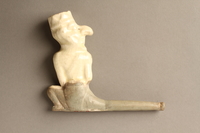
White ceramic pipe with a Jewish caricature as the bowl
Object
This pipe is one of the more than 900 items in the Katz Ehrenthal Collection of antisemitic artifacts and visual materials.
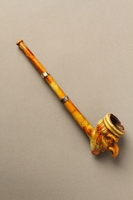
Painted porcelain cigarette holder molded as the head of a Jew
Object
This cigarette holder is one of the more than 900 items in the Katz Ehrenthal Collection of antisemitic artifacts and visual materials.
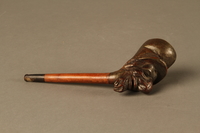
Wooden figure of a Jew with a removable head to use a pipe
Object
This pipe is one of the more than 900 items in the Katz Ehrenthal Collection of antisemitic artifacts and visual materials.

Ceramic coin bank shaped like a Jewish banker with comical features
Object
Small money bank, opened by a key, shaped like a man, dressed in colorful clothes with a huge nose. This bank is one of more than 900 items in the Katz Ehrenthal Collection of antisemitic artifacts and visual materials.
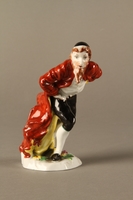
Capodimonte figurine of a Jewish gentleman
Object
Porcelain figurine of a young, Jewish man, manufactured by the Royal Factory of Capodimonte in Naples, Italy, likely during the late 18th or early 19th century. The figurine’s pose and dress bear a resemblance to depictions of the commedia dell'arte character, Pantalone. Commedia dell’arte is a theatrical form that emerged in northern Italy in the 15th century. The actors wore masks on stage as a homage to ancient Roman comedies. Pantalone’s mask usually had a large, hooked nose; a stereotypically Jewish feature. The figurine further embellishes the stereotype by featuring Pantalone with red hair and wearing a kippah, a traditional Jewish cap. Pantalone was usually a greedy old merchant, who would often romantically pursue, and be rejected by younger women. Commedia dell’arte was popular throughout Europe, and figurines of the characters were popular molds for porcelain makers. The Royal Factory of Capodimonte began manufacturing porcelain during the mid-18th century. However, Capodimonte now refers to porcelain designs that have emotive, Italian styling typical of those earlier pieces. In 1743, Charles of Bourbon, King of Naples and Sicily, commissioned the construction of a porcelain factory in the Royal Wood of Capodimonte. In 1759, when Charles ascended to the Spanish throne, he brought the molds, models, and artists with him to Spain and demolished the factory in Italy. Afterwards, Charles’ son, Ferdinand, inherited his father’s title in Italy, as well as his interest in porcelain. He began construction of a new facility in 1771, and production continued throughout the tumultuous Napoleonic Wars. During the first decades of the 1800s, Ginori Porcelain Manufactory purchased the Royal Capodimonte factory molds and equipment, and began manufacturing Capodimonte styled porcelain. This figurine is one of the more than 900 items in the Katz Ehrenthal Collection of antisemitic artifacts and visual materials.
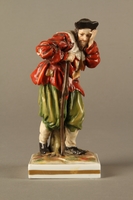
Ginori porcelain figurine of the Wandering Jew
Object
Capodimonte-style porcelain figurine of the Wandering Jew, manufactured by Ginori Manufactory in Doccia, Italy, likely during the early or mid-19th century. Originally, the Royal Factory of Capodimonte manufactured Capodimonte porcelain between 1743 and 1759. However, Capodimonte now refers to porcelain designs that have emotive Italian styling typical of those earlier pieces. Marchese Carlo Ginori established the Ginori Porcelain Manufactory in Doccia in 1735. During the first decades of the 1800s, Ginori purchased the Royal Capodimonte factory molds and equipment and began manufacturing Capodimonte-style porcelain. The Wandering Jew is an antisemitic legend of a Jewish man (in some versions named Ahasuerus) who taunted Jesus on his way to be crucified. In response, Jesus said, “I stand and rest, but you will go on,” dooming him to live until the end of the world or the second coming of Christ. The story’s origin is uncertain, although parts may have been inspired by biblical passages. Some versions name the wanderer Cartaphilus, and claim he was Pontius Pilate’s doorkeeper, who struck Jesus, urging him to go faster on the path to his crucifixion. The Ahasuerus version can be traced back to a German pamphlet published in 1602, which was translated into several languages and widely distributed. The story of the Wandering Jew has been portrayed and depicted in works of art, poetry, literature, plays, and films. This figurine is one of the more than 900 items in the Katz Ehrenthal Collection of antisemitic artifacts and visual materials.
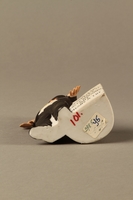
Bisque cigarette holder of a Jewish man with outstretched hands
Object
This statue is one of the more than 900 items in the Katz Ehrenthal Collection of antisemitic artifacts and visual materials.
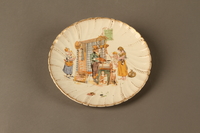
Porcelain plate with a scene of a Jewish pawn shop owner and Gentile customer
Object
Porcelain dish painted with a scene named Solomon's Pawnshop, depicting a barefooted poor Christian woman selling something to a Jewish pawn shop owner. This plate is one of the more than 900 items in the Katz Ehrenthal Collection of antisemitic artifacts and visual materials.
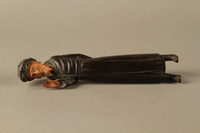
Carved wooden figure of a standing Jew enclosing a scribe's set
Object
This statue is one of the more than 900 items in the Katz Ehrenthal Collection of antisemitic artifacts and visual materials.
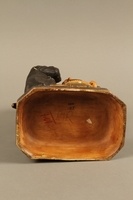
Painted figure group of a poor Jew whispering to a wealthy merchant
Object
Painted ceramic group, A Stock Market Tip, depicting a Jew whispering into the ear of a wealthy gentleman. This statue is one of the more than 900 items in the Katz Ehrenthal Collection of antisemitic artifacts and visual materials.
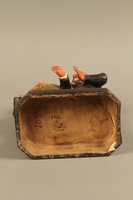
Ceramic figure group of a poor Jew with an unhappy merchant
Object
Painted ceramic group, A Stock Market Tip, depicting a shabily dressed Jew stadning with his hand on the shoulder of a plump Jewish merchant. This statue is one of the more than 900 items in the Katz Ehrenthal Collection of antisemitic artifacts and visual materials.
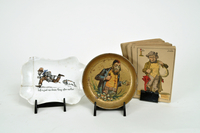
Porcelain dish with a scene of a Jewish beggar being chased by a dog
Object
Small ceramic plate with a Jewish moocher or beggar dressed in patched clothes being chased by a bulldog above the phrase "Life is just one damn thing after another." This plate is one of more than 900 items in the Katz Ehrenthal Collection of antisemitic artifacts and visual materials.
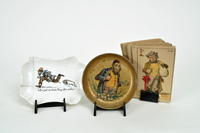
Small dish with a painting of a Jew scratching himself
Object
Small, tin novelty plate with a painted image of a Jewish man scratching himself, framed by a garland of onions or garlic bulbs. The man is wearing a kippah and has several stereotypical physical features commonly attributed to Jewish men: a large nose, sidelocks, and a beard. He appears well dressed, with a collared jacket and a dapper shirt, but he is scratching his chest in an uncouth manner. Below the image is a garland of white vegetables, either onions or garlic bulbs. Both vegetables are traditionally associated with Jews. They are also mentioned in the Bible and in rabbinic literature. During the 19th century, it was believed that Jews had an odor that resembled the smell of onion and garlic, caused by bad hygiene or a poor diet. This was an evolution of an older, unfounded antisemitic belief known as “foetor judaicus,” which was a perceived stench that emanated from Jews. Foetor judaicus was used as an extension of several unsubstantiated myths. Its perceived existence was used to legitimize other antisemitic beliefs and it was an invented consequence of Jews’ supposed wicked actions. Some believed foetor judaicus was a curse on Jews from God, others believed that the odor was an effect of blood libel (the baseless belief that Jews ritually murdered Christians). A third belief was that foetor judaicus was an effect of Jews’ propensity for male menstruation and evidence of Jewish male femininity. This plate is one of more than 900 items in the Katz Ehrenthal Collection of antisemitic artifacts and visual materials.
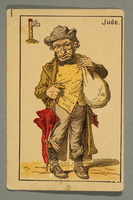
Schwarzer Peter playing card deck with German social roles
Object
Deck of playing cards with a card featuring a dirty and unpleasant looking Jewish peddler labeled Jude. This deck of playing cards is one of the more than 900 items in the Katz Ehrenthal Collection of antisemitic artifacts and visual materials.
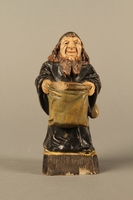
Ceramic match holder of a Jew holding out a bag
Object
This match holder is one of the more than 900 items in the Katz Ehrenthal Collection of antisemitic artifacts and visual materials.
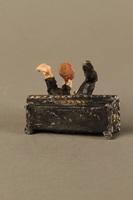
Painted metal figurine of a drunken Jewish man in a trough
Object
Comical souvenir 2 part figurine of a young, red haired Orthodox Jewish man who has fallen into a watering trough, yet managed to hold his overflowing beer mug aloft. This figurine is one of the more than 900 items in the Katz Ehrenthal Collection of antisemitic artifacts and visual materials.
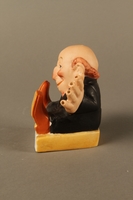
Painted bisque toothpick holder of a Jewish man
Object
Painted bisque toothpick holder of a caricatured Jewish man labelled How Much on Dis. This toothpick holder is one of the more than 900 items in the Katz Ehrenthal Collection of antisemitic artifacts and visual materials.
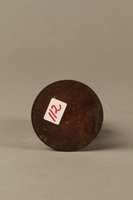
Bronze bust of a bourgeois Jewish businessman
Object
Bronze bust with a caricatured depiction of a Jewish man in a suit, labelled Herr V. Mayer, with exaggerated Jewish facial features. This bust is one of the more than 900 items in the Katz Ehrenthal Collection of antisemitic artifacts and visual materials.
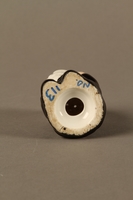
Porcelain salt shaker of a caricatured Orthodox Jewish man
Object
This salt shaker is one of the more than 900 items in the Katz Ehrenthal Collection of antisemitic artifacts and visual materials.
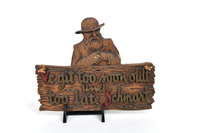
Wooden plaque of a Jew and a sign with a folk saying
Object
This plaque is one of the more than 900 items in the Katz Ehrenthal Collection of antisemitic artifacts and visual materials.
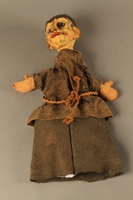
Paper mache puppet of a Jewish man in a prison uniform
Object
This puppet is one of the more than 900 items in the Katz Ehrenthal Collection of antisemitic artifacts and visual materials.
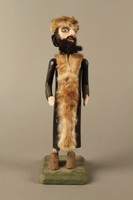
Wooden spring balanced figure of a Hasidic Jew
Object
Wooden spring balanced figure of a Hasidic Jew that sways as if davening. This balancing figure is one of the more than 900 items in the Katz Ehrenthal Collection of antisemitic artifacts and visual materials.
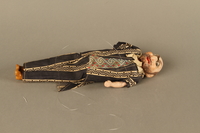
Puppet of a Jewish man that squeaks when the stomach is pressed
Object
Papier-mache puppet used in a puppet show that squeaks when the belly is pushed. The puppet is one of the more than 900 items in the Katz Ehrenthal Collection of antisemitic artifacts and visual materials.
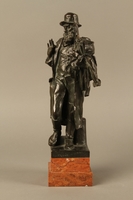
Bronze figure of a Jewish peddler by Anton Mashik
Object
This statue is one of the more than 900 items in the Katz Ehrenthal Collection of antisemitic artifacts and visual materials.
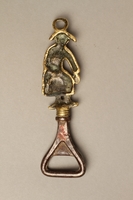
Cast metal bottle opener with a Fagin shaped handle
Object
Bottle opener with a cast brass handle shaped like Fagin, a devil-like Jewish criminal from the novel, Oliver Twist, by Charles Dickens, 1837-39. Fagin's characterization is antisemitic and exploits many negative stereotypes. Referred to as The Jew, Fagin is villainous, greedy, and repulsive, with black nails, fanglike teeth, and he kidnaps small children to make them thieves. Dickens shared a common prejudice of the time, saying that if he had a character who was a fence, he had to be a Jew because "that class of criminal almost invariably was a Jew." Many adaptations try to sidestep the complications of Fagin's ethnic identity, or make him more of a comic figure, but his Jewishness is central to his depiction. This bottle opener is one of the more than 900 items in the Katz Ehrenthal Collection of antisemitic artifacts and visual materials.
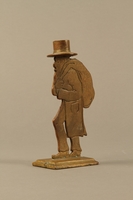
Brass figure of a Jewish peddler
Object
Nineteenth-century brass figure of a Jewish peddler carrying a sack of goods on his back. Peddlers were itinerant vendors who traveled the countryside and sold goods to the public. Peddling was a common occupation for young Jewish men during the 18th and 19th centuries. Most peddlers hoped their hard work would serve as a springboard to more lucrative and comfortable occupations. However, old prejudices formed an antisemitic stereotype of the Jewish peddler. The stereotype originated from the economic and professional restrictions placed on early European Jews. They were barred from owning land, farming, joining trade guilds, and military service. These restrictions limited Jews to the occupations of retail peddling, hawking, and moneylending. Additionally, medieval religious belief held that charging interest (known as usury) was sinful, and the Jews who occupied these professions were looked down upon, predominantly by European Christians. They were perceived as morally deficient and willing to engage in unethical business practices. The inability of Jews to legally hold other occupations, combined with Christians’ disdain for the professions Jews were allowed to practice, helped form the canard of the greedy Jew who exploited Gentiles. This canard was often visually depicted as a Jewish peddler, an untrustworthy figure that sold cut rate items at inflated prices. This figure is one of the more than 900 items in the Katz Ehrenthal Collection of antisemitic artifacts and visual materials.
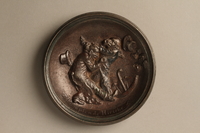
Small circular dish with a relief of two Jewish men fighting
Object
Small plate with a relief image of two Jewish men fighting, called Kampfende Hirsche [Fighting Bucks.] This image is based upon a painting by an unknown artist; see 2016.184.634 for a reproduction. The image is a parody of an extremely popular genre of nature paintings, many also titled Fighting Stags, which presented romanticized visions of magnificent antlered stags fighting in a clearing. There was also a popular photograph published by Oscar Kramer (1835-1892), of Vienna, titled, Kampfende Hirsche, Zwei polnische Juden in e. Balgerei [Fighting Stags: Two Polish Jews in a Tussle], which may have been known by the artist. The Jewish men are viewed as subjects of ridicule for their repellant physical appearance, their ineptness as fighters, and their undignified public behavior. Antisemitism was an increasingly popular topic in Austria at the time. This dish is one of more than 900 items in the Katz Ehrenthal Collection of antisemitic visual materials.
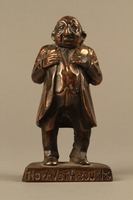
Bronze figurine mocking a pompous Jewish man with an accent
Object
Bronze figurine of a caricatured Jewish businessman with the caption: “Now! Vot about it?” He has several stereotypical physical features commonly attributed to Jewish men: a large, hooked nose, large ears, thick eyebrows, hooded eyes, and bowed legs. Many of these traits were common elements developed by European artists and illustrators in previous centuries. The caption presents a phrase spoken in what is often referred to as a stereotypical Jewish accent where “what” is pronounced as “vot,” and the first letter of each word is capitalized to show the pitch and tonality is higher at the beginning than at the end of each word. This accent has a strong association with New York City (NYC) and the Northeastern region of the United States. NYC was a focal point for Eastern European Jewish immigrants fleeing antisemitic pogroms between approximately 1880 and 1920. This figurine is one of the more than 900 items in the Katz Ehrenthal Collection of antisemitic artifacts and visual materials.
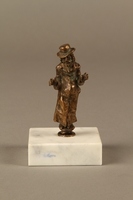
Bronze figurine of a Jewish schnorrer in his traditional long coat
Object
Bronze figurine of a Jewish schnorrer, made in Austria during the 19th century. The figurine was possibly made in the style of Vienna Bronze, a handcraft tradition of bronze sculptures incorporating artistic finishes that began in Vienna, Austria around 1850. Schnorrer is a Judeo-German term for a Jewish beggar. During the Chmielnicki pogroms in Poland (1648-57), hundreds of Jewish communities were destroyed and thousands of Jews fled west after the destruction of their homes and way of life. Afterward, the influx of destitute Jewish refugees in central Europe helped create the archetype of the Jewish beggar, or schnorrer. Unlike a beggar or panhandler, who could be distinguished by their ragged outward appearance, a stereotypical schnorrer dressed respectably. Schnorrers were characterized as impudent, with an air of entitlement to disguise their true needs from charitable individuals. They were evasive about why they needed assistance, and were not satisfied with small favors. Typical reasons given for a schnorrer’s collection included recovering from the destruction of their home, or to fund the dowry for their daughter or another relative. Schnorrers were said to invert the act of charity; by asking for handouts, they give the affluent members of society a chance to do a good deed, which complies with the Jewish communal practice of providing aid to those less well off in the community, meaning the charitable patron should be thankful to the schnorrer for providing the opportunity. This figurine is one of the more than 900 items in the Katz Ehrenthal Collection of antisemitic artifacts and visual materials.
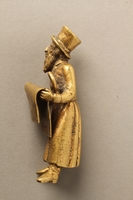
Bronze figurine of a Jewish man reading a newspaper
Object
Small bronze figurine of a Jewish man reading a newspaper titled, “catalog.” The man has several stereotypical physical features commonly attributed to Jewish men: a large nose, sidelocks, and a beard. He is wearing a caftan (kaftan) and has a large, curved umbrella handle protruding from the sash at his waist. A caftan is a long-sleeved, ankle-length coat with an open-cut at the front. Many Eastern Polish and Western Russian Jews began wearing caftans fastened with wide oriental-style sashes in the late medieval period. The garb later spread to Central Europe, but in place of the sash, a cord was used to close the front of the garment instead. Umbrellas were a common accessory carried by Jewish peddlers who spent most of their time outdoors. Peddlers were itinerant vendors who traveled the countryside and sold goods to the public. However, old prejudices stemming from the economic and professional restrictions placed on early European Jews, along with Christians’ disdain for the professions Jews were allowed to practice, formed an antisemitic stereotype of the greedy Jew who exploited Gentiles. This canard was often visually depicted as a Jewish peddler, an untrustworthy figure that sold cut rate items at inflated prices. Both umbrellas and caftans were featured prominently in antisemitic depictions of Eastern European Jews. This figurine is one of the more than 900 items in the Katz Ehrenthal Collection of antisemitic artifacts and visual materials.
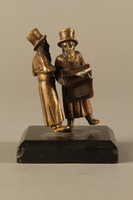
Bronze figurine of two Jewish men standing in conversation
Object
Small bronze figurine of two Jewish men with several stereotypical physical features commonly attributed to Jewish men: large noses, sidelocks, and beards. They are wearing caftans (kaftans) belted by wide sashes at the waist. A caftan is a long-sleeved, ankle-length coat with an open-cut at the front. Many Eastern Polish and Western Russian Jews began wearing caftans fastened with wide, oriental-style sashes in the late medieval period. The garb later spread to Central Europe, but in place of the sash, a cord was used to close the front of the garment instead. These garments were often worn by peddlers, itinerant vendors who traveled the countryside and sold goods to the public. However, old prejudices stemming from the economic and professional restrictions placed on early European Jews, along with Christians’ disdain for the professions Jews were allowed to practice, formed an antisemitic stereotype of the greedy Jew who exploited Gentiles. This canard was often visually depicted as a Jewish peddler, an untrustworthy figure that sold cut-rate items at inflated prices. Both caftans and wide sashes were featured prominently in antisemitic depictions of Eastern European Jews. This figurine is one of the more than 900 items in the Katz Ehrenthal Collection of antisemitic artifacts and visual materials.

Painted bronze figurine of a Sephardic Jewish money changer
Object
Vienna bronze figurine of a Jewish money changer made in the 19th century. He is dressed in a thawb (robe) and a turban, which gives him the Middle Eastern appearance of a Sephardic Jew. Vienna bronzes are bronze sculptures made in a Viennese handcraft tradition that incorporates artistic finishes. The style began in Austria in approximately 1850. Sephardic Jews are the descendants of the 200,000 Jews who were expelled from Spain in 1492, during the Spanish Inquisition. Many Sephardi escaped to Turkey, where they were free to practice their religion and participate in commerce. Consequently, many depictions of Sephardi have exaggerated exotic, Eastern motifs. Many antisemitic depictions of Jews show them hoarding, counting, or handling money. These stereotypes originated from the economic and professional restrictions placed on early European Jews. They were barred from owning land, farming, joining trade guilds, and military service. These restrictions forced many Jews into occupations such as money changing (exchanging foreign coins or currency for those used locally). Additionally, medieval religious belief held that charging interest (known as usury) was sinful, and the Jews who occupied these professions were looked down upon, predominantly by European Christians. They were perceived as morally deficient and willing to engage in unethical business practices. The inability of Jews to legally hold other occupations, combined with Christians’ disdain for the professions Jews were allowed to practice, helped form the canard of the greedy Jew who exploited Gentiles. This canard was often visually depicted as a Jewish man expressing an exaggerated desire for, or counting money. The figurine is one of more than 900 items in the Katz Ehrenthal Collection of antisemitic artifacts and visual materials.
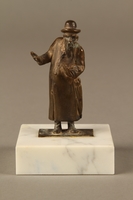
Bronze figurine of a male Jewish matchmaker with an umbrella at his side
Object
Small bronze figurine of a Jewish shadchan wearing a long overcoat with an umbrella hanging on his arm. The man has several stereotypical physical features commonly attributed to Jewish men: a large nose, hooded eyes, and a beard. In the 19th century, a Jewish man with an umbrella became a common stereotype and featured prominently in antisemitic depictions of Eastern European Jews. Umbrellas were a common accessory carried by Jewish peddlers who spent most of their time outdoors, and this stereotype may have originated with them. Shadchan (sometimes spelled, shadkhan) is the Hebrew term for a matchmaker, also known as a marriage broker. Male matchmakers are called “shadchans,” and female ones are “shadchanit.” In return for financial compensation, a matchmaker would suggest prospective marriage mates based on the compatibility of the individuals and the suitability of their families. The matchmaker would then coach them through the courting process. Over time, the societal role of the matchmaker began to decline. However, the archetypal character of a Jewish matchmaker who glosses over physical and character defects of their clients has remained. This figurine is one of the more than 900 items in the Katz Ehrenthal Collection of antisemitic artifacts and visual materials.
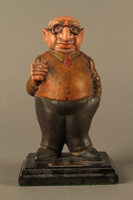
Painted wooden figurine of a Jewish banker
Object
The figurine is one of the more than 900 items in the Katz Ehrenthal Collection of antisemitic artifacts and visual materials.

Painted wooden figurine of a Jewish peddler
Object
The statue is one of the more than 900 items in the Katz Ehrenthal Collection of antisemitic artifacts and visual materials.
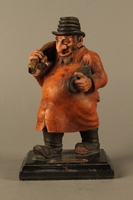
Painted wooden figurine of a Jewish schnorrer
Object
The figurine is one of the more than 900 items in the Katz Ehrenthal Collection of antisemitic artifacts and visual materials.
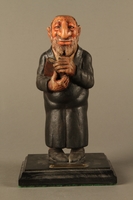
Hand carved and painted wooden figurine of a Rabbi
Object
The figurine is one of the more than 900 items in the Katz Ehrenthal Collection of antisemitic artifacts and visual materials.
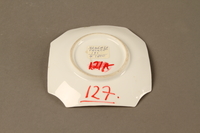
Porcelain plate with scene of a peddler’s conference
Object
The plate is one of the more than 900 items in the Katz Ehrenthal Collection of antisemitic artifacts and visual materials.
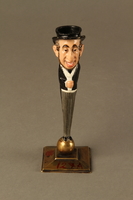
Pair of painted candlesticks of a happy and a sad Jewish speculator
Object
Pair of painted bronze candleholders depicting Jewish speculators made around 1880 in Vienna, Austria. One speculator has a happy face with the term “hausse” inscribed on the base, the other has a sad face and the term “baisse” inscribed on the base. Both words are stock market terminology derived from the French words for “rise” and “drop.” The terms refer to the comparative price of assets at the times of buying and selling. The placement of the “baisse” on the sad-faced candleholder and the “hausse” on the happy one implies that Jews prefer to buy assets at lower prices and then sell them at a higher price, profiting from the price fluctuation. This references the antisemitic stereotypes of the greedy Jew who exploits Gentiles for their own economic advantage, and Jewish control of finance. These stereotypes originated from the economic and professional restrictions placed on early European Jews. They were barred from owning land, farming, joining trade guilds, and military service. These restrictions limited Jews to the occupations of retail peddling, hawking, and moneylending. Additionally, medieval religious belief held that charging interest (known as usury) was sinful, and the Jews who occupied these professions were looked down upon, predominantly by European Christians. They were perceived as morally deficient and willing to engage in unethical business practices. The inability of Jews to legally hold other occupations, combined with Christians’ disdain for the professions Jews were allowed to practice, helped form the canard of the greedy Jew who exploited Gentiles, and created negative connotations for Jews who worked in finance. The candlesticks are two of the more than 900 items in the Katz Ehrenthal Collection of antisemitic artifacts and visual materials.
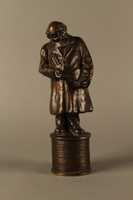
Bronze statue of a Jewish money changer
Object
Bronze 19th-century figurine of a Jewish money changer looking at the coins in his hands. The figurine was possibly made in the style of Vienna Bronze, bronze sculptures made in a Viennese handcraft tradition that incorporates artistic finishes that began in Austria around 1850. Money changers exchanged foreign coins or currency for those used locally. Many antisemitic depictions of Jews show them hoarding, counting, or handling money. These stereotypes originated from the economic and professional restrictions placed on early European Jews. They were barred from owning land, farming, joining trade guilds, and military service. These restrictions forced many Jews into occupations such as money changing or money lending. Additionally, medieval religious belief held that charging interest (known as usury) was sinful, and the Jews who occupied these professions were looked down upon, predominantly by European Christians. They were perceived as morally deficient, greedy, and willing to engage in unethical business practices. Jews’ inability to legally hold other occupations, combined with Christians’ disdain for the professions Jews were allowed to practice, helped form the canard of the greedy Jew who exploited Gentiles. This canard was often visually depicted as a Jewish man expressing an exaggerated desire for, or counting money. The figurine is one of more than 900 items in the Katz Ehrenthal Collection of antisemitic artifacts and visual materials.
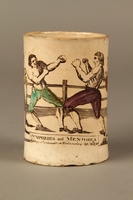
Staffordshire creamware mug of final Mendoza v. Humphreys bout
Object
Staffordshire creamware mug depicting Jewish boxer Daniel Mendoza and his former mentor Richard Humphreys, also spelled Humphries, in their third and final bareknuckle boxing match, September 29, 1790, in Doncaster, England. Mendoza held back for several rounds, but still won quickly. Humphreys won the first bout in 1788, and Mendoza the second in 1789. Billed as Mendoza the Jew, he was Champion of England from 1792 to 1795. Mendoza was the first prominent Jewish prizefighter in England. He was smaller than his opponents, and won with superior technique, speed, and agility. His style, known as the Mendoza or Jewish school, is credited with inspiring a generation of boxers and establishing many elements of modern boxing. The mug is one of the more than 900 items in the Katz Ehrenthal Collection of antisemitic artifacts and visual materials.
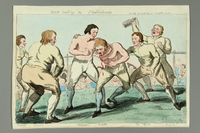
Gillray print of Jewish boxer Mendoza winning 1st match with Ward
Object
Colored etching by James Gillray of Jewish boxer Daniel Mendoza and Bill Ward near the end of a bareknuckle match on May 14, 1792, near Croydon, England. Mendoza won, overpowering Ward, born Warr, and leaving him too injured to walk away unassisted. The match was fought to settle Ward’s dispute with Mendoza’s claim to the title, Champion of England. Billed as Mendoza the Jew, he held the title from 1792 to 1795. He was the first prominent Jewish prizefighter in England and inspired a generation of boxers. Mendoza was smaller than his opponents, and won due to his superior technique, speed, and agility. His style, known as the Mendoza or Jewish school, established many elements of modern boxing. Gillray (1756-1815) was one of the greatest caricaturists of the 18th century. The print is one of the more than 900 items in the Katz Ehrenthal Collection of antisemitic artifacts and visual materials.
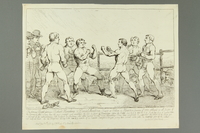
Gillray etching of Jewish boxer Mendoza in 1st Humphreys bout
Object
Etching by James Gillray of Jewish boxer Daniel Mendoza and his former mentor, Richard Humphreys, in the middle of a boxing match on January 9, 1788, in Odiham, England. Mendoza lost the fight unexpectedly after injuring his leg. This was the first of three matches to decide the Champion. Mendoza beat Humphreys in 1789 and 1790. Billed as Mendoza the Jew, he held the title from 1792 to 1795. He was the first prominent Jewish prizefighter in England and inspired a generation of boxers. Mendoza was smaller than his opponents, and won due to his superior technique, speed, and agility. His style, known as the Mendoza or Jewish school, established many elements of modern boxing. Gillray (1756-1815) was one of the greatest caricaturists of the 18th century. The print is one of the more than 900 items in the Katz Ehrenthal Collection of antisemitic artifacts and visual materials.
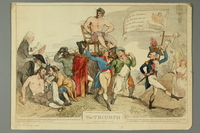
Print of Humphreys enthroned after defeat of Jewish boxer Mendoza
Object
Satirical color etching by Thomas Harmar of an allegorical triumphal parade by Richard Humphreys after his victory against Jewish boxer Daniel Mendoza, who was badly injured in their match on January 9, 1788, in Odiham, England. Mendoza’s loss gave his former mentor and his supporters the opportunity to boast about defeating the popular Jew. This was the first of three matches to decide who fought the champion. Mendoza beat Humphreys in 1789 and 1790. Billed as Mendoza the Jew, he held the title of Champion of England from 1792 to 1795, and was the first prominent Jewish prizefighter in England. Mendoza was smaller than his opponents, and won bouts by superior technique, speed, and agility. His style, known as the Mendoza or Jewish school, is credited with inspiring a generation of boxers and establishing elements of modern boxing. The print is one of the more than 900 items in the Katz Ehrenthal Collection of antisemitic artifacts and visual materials.
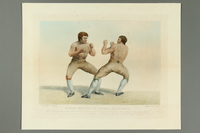
Etching of 3rd match, Jewish boxer Mendoza v Humphreys
Object
Colored etching by C.R. Ryley of Jewish boxer Daniel Mendoza and his former mentor, Richard Humphreys, in a match on September 29, 1790, in Doncaster, England. Mendoza held back for several rounds, but still won quickly. This was their third match to decide who was Champion. Humphreys won the first bout in 1788 and Mendoza the second in 1789. Billed as Mendoza the Jew, he held the title of Champion of England from 1792 to 1795, and was the first prominent Jewish prizefighter in England. Mendoza was smaller than his opponents, and won bouts with superior technique, speed, and agility. His style, known as the Mendoza or Jewish school, is credited with inspiring a generation of boxers and establishing many elements of modern boxing. The print is one of the more than 900 items in the Katz Ehrenthal Collection of antisemitic artifacts and visual materials.
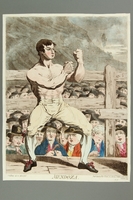
Gillray print of Jewish boxer Mendoza in fighting stance
Object
Colored etching by James Gillray with a portrait of Jewish bareknuckle prizefighter Daniel Mendoza in a fighting stance. Billed as Mendoza the Jew, he held the title of Champion of England from 1792 to 1795, and was the first prominent Jewish prizefighter in England. Mendoza was smaller than his opponents, and won his bouts with superior technique, speed, and agility. His style, known as the Mendoza or Jewish school, is credited with inspiring a generation of boxers and establishing many elements of modern boxing. The print is one of the more than 900 items in the Katz Ehrenthal Collection of antisemitic artifacts and visual materials.
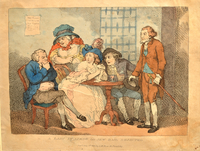
Rowlandson etching of a bailiff suspicious of a Jewish bail bondsman
Object
Colored etching by T. Rowlandson of a scene from Fleet prison whereby a lady is distressed because the prison official is reluctant to accept bail from a Jew. The etching is one of the more than 900 items in the Katz Ehrenthal Collection of antisemitic artifacts and visual materials.
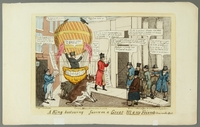
Satirical print of Rothschild's lack of charity to other Jews
Object
The etching is one of the more than 900 items in the Katz Ehrenthal Collection of antisemitic artifacts and visual materials.
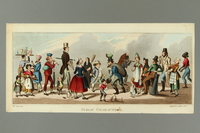
Aquatint of people seen on the street, including a Jewish peddler
Object
Print of public London characters by an unknown artist published in 1827. Such picturesque scenes of urban life were the most lastingly popular series of English prints. The series known as London Cries, often featured outcasts or poor people who made their living on the London streets, such as street vendors, often Jewish, selling fruit, rag, ribbons, and trinkets, laborers, street musicians, and beggars. The street people were usually depicted as diligent workers deserving respect, not as nuisances or figures of fun. They were recognized for the color and conveniences they brought to city life. Pictures depicting public characters and a broader ranges of social types and classes became especially popular in the early 19th century. Scenes he aquatint is one of the more than 900 items in the Katz Ehrenthal Collection of antisemitic artifacts and visual materials.
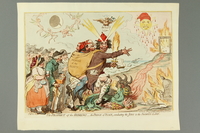
Gillray print of the founder of the British Israel movement
Object
Satirical print by James Gillray of a crazed looking Richard Brothers leading the Jews to the Promised Land. This print was published the day after his March 4, 1795, arrest for interference with state politics, for which he was charged with treasonable practices. Brothers (1757-1824) was the founder of the British Israel movement, self styled Nephew of the Almighty, descendent of David, who claimed he was chosen to return the Jews to the Promised Land. He is shown wearing a red Phrygian cap and no pants, a reference to his opposition to the British war against France, and his support of the sans culottes of the French Revolution, who he viewed as chosen people. The men in his sack are members of Parliament who opposed the war. Brothers claimed to have prophetic visions, such as the destruction of the city of London and the collapse of the monarchy. During his arrest in 1792, Isabella Wake brought him bread weekly, and he foresaw a great role for her in his new Kingdom. After this 1795 arrest, he was found to be a criminal lunatic and sent to an insane asylum. The etching is one of the more than 900 items in the Katz Ehrenthal Collection of antisemitic artifacts and visual materials.
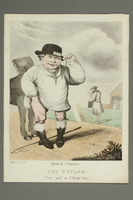
Cartoon of a jockey eyeing his watch bought from a Jewish peddler
Object
British antisemitic cartoon published in 1828, showing a man inspecting a watch he just bought from a Jewish peddler. The cartoon was drawn by Joseph Lisle, a British caricaturist, satirical artist and printmaker. Peddlers were itinerant vendors who sold goods to the public. They usually traveled alone and carried their goods with them as they went. Peddling was a common occupation for young Jewish men during the 18th and 19th centuries. Most peddlers hoped their hard work would serve as a springboard to more lucrative and comfortable occupations. However, old prejudices formed an antisemitic stereotype of the Jewish peddler. The stereotype originated from the economic and professional restrictions placed on early European Jews. They were barred from owning land, farming, joining trade guilds, and military service. These restrictions limited Jews to the occupations of retail peddling, hawking, and moneylending. Additionally, medieval religious belief held that charging interest (known as usury) was sinful, and the Jews who occupied these professions were looked down upon, predominantly by European Christians. They were perceived as morally deficient and willing to engage in unethical business practices. The inability of Jews to legally hold other occupations, combined with Christians’ disdain for the professions Jews were allowed to practice, helped form the canard of the greedy Jew who exploited Gentiles. This canard was often visually depicted as a Jewish peddler, an untrustworthy figure that sold cut rate items at inflated prices. This aquatint is one of the more than 900 items in the Katz Ehrenthal Collection of antisemitic artifacts and visual materials.
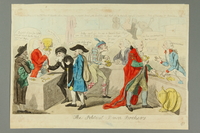
Cruikshank print of politicians bartering in a pawnshop
Object
The etching is one of the more than 900 items in the Katz Ehrenthal Collection of antisemitic artifacts and visual materials.

Print of gentile children stealing from a Jewish peddler
Object
The etching is one of the more than 900 items in the Katz Ehrenthal Collection of antisemitic artifacts and visual materials.
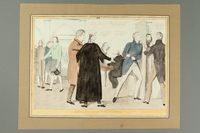
Satirical print of a Jew trying to enter Parliament
Object
The lithograph is one of the more than 900 items in the Katz Ehrenthal Collection of antisemitic artifacts and visual materials.
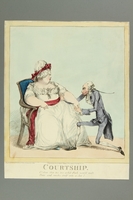
Print of a very thin Jew wooing a very fat lady
Object
The etching is one of the more than 900 items in the Katz Ehrenthal Collection of antisemitic artifacts and visual materials.
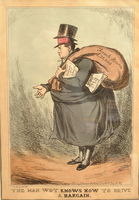
Caricature of Nathan Mayer Rothschild with newspaper and sack
Object
The etching is one of the more than 900 items in the Katz Ehrenthal Collection of antisemitic artifacts and visual materials.
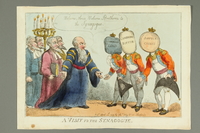
Print of 3 dukes with trade good heads bowing to 5 Jewish elders
Object
Satire of an 1809 royal visit to the Great Synagogue (Bevis Marks) of London by three sons of King George III, represented as "Cumberland Lead" (Duke of Cumberland), 'Cambridge Butter' (Duke of Cambridge) and 'Suffolk Cheese' (Duke of Suffolk). The etching is one of the more than 900 items in the Katz Ehrenthal Collection of antisemitic artifacts and visual materials.
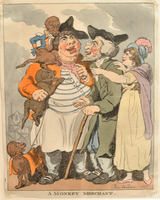
Rowlandson print of a monkey merchant with an old Jewish man and his gentile mistress
Object
The etching is one of the more than 900 items in the Katz Ehrenthal Collection of antisemitic artifacts and visual materials.
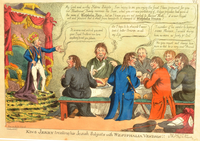
Satiric print about the emancipation of the Jews of Westphalia by King Jerome
Object
In early July 1807, following Napoleon Bonaparte’s victories over the Prussians at Jena and Auerstädt, and the Russians at Friedland, France signed the Treaties of Tilsit with both nations in Tilsit, Prussia (now Sovetsk, Russia). France and Russia became allies, while Austria and Prussia were divided up between them. From part of the region, Napoleon created The Kingdom of Westphalia, where he installed his brother Jerome as King. The region was struggling financially, prompting Jerome to seek out financial support. He tried to win favor and support with the wealthy Jewish community in his Kingdom by removing many of the restrictions forced on the Jews of Westphalia. He officially removed these restrictions on January 27, 1808. The depicted image is from September 1807, during the time when he was trying to win favor with the community. The Jews are depicted with stereotypical features, like large, pointed noses, fleshy lips, and pointed beards, while the King is similarly depicted, though in reality he was considered to have more classical features. The image plays on the commonly mocked theme of Jewish people enjoying ham, which was forbidden to them. Furthermore, by having the King decree that the ham was now called venison, the artist is poking fun at the Jews and at the actions taken by the King to win their financial backing. The etching is one of the more than 900 items in the Katz Ehrenthal Collection of antisemitic artifacts and visual materials.
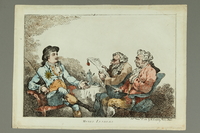
Print of two Jewish moneylenders with a gentile client
Object
The etching is one of the more than 900 items in the Katz Ehrenthal Collection of antisemitic artifacts and visual materials.
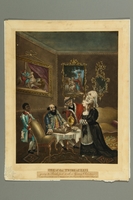
Color print of an old Jew inviting a young woman to dine
Object
The lithograph is one of the more than 900 items in the Katz Ehrenthal Collection of antisemitic artifacts and visual materials.
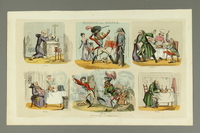
Print with 6 vignettes of a monk, a soldier, and a Jew
Object
The etching is one of the more than 900 items in the Katz Ehrenthal Collection of antisemitic artifacts and visual materials.
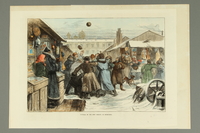
Color print of Jewish men playing soccer in a snow covered market
Object
The print is one of the more than 900 items in the Katz Ehrenthal Collection of antisemitic artifacts and visual materials.
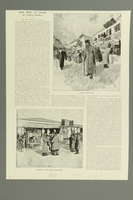
Illustrated sheet from a London weekly with an article on Jews by an American artist
Object
Leaf from The Illustrated London News, circa 1880s, with an article by Joseph Pennell, "The Jew at Home", with two illustrations by Pennell. The print is one of the more than 900 items in the Katz Ehrenthal Collection of antisemitic artifacts and visual materials.

Woodcut of a Jewish peddler in front of a shack
Object
The print is one of the more than 900 items in the Katz Ehrenthal Collection of antisemitic artifacts and visual materials.
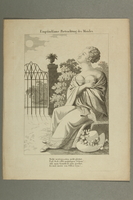
Print of a busty Jewish woman admiring the moon
Object
The etching is one of the more than 900 items in the Katz Ehrenthal Collection of antisemitic artifacts and visual materials.
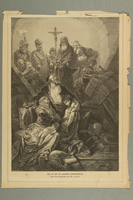
Print of a Jewish family found by the Grand Inquisitor
Object
The print is one of the more than 900 items in the Katz Ehrenthal Collection of antisemitic artifacts and visual materials.
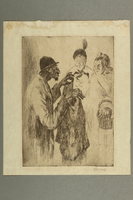
Woodcut print of a Jewish peddler showing clothes to two women
Object
Woodcut print depicting a peddler showing old clothes to two women. He has dark skin, thick eyebrows, a large nose, and thick, fleshy lips; all stereotypical physical features commonly attributed to Jewish men. Peddlers were itinerant vendors who sold goods to the public. They usually traveled alone and carried their goods with them as they went. Clothes peddlers dealt in old garments they bought, cleaned and repaired, and then sold for profit. Peddling was a common occupation for Jewish men during the 18th and 19th centuries. However, old prejudices formed an antisemitic stereotype of the Jewish peddler. The stereotype originated from the economic and professional restrictions placed on early European Jews. They were barred from owning land, farming, joining trade guilds, and military service. These restrictions limited Jews to the occupations of retail peddling, hawking, and moneylending. Additionally, medieval religious belief held that charging interest (known as usury) was sinful, and the Jews who occupied these professions were looked down upon, predominantly by European Christians. They were perceived as morally deficient and willing to engage in unethical business practices. The inability of Jews to legally hold other occupations, combined with Christians’ disdain for the professions Jews were allowed to practice, helped form the canard of the greedy Jew who exploited Gentiles. This canard was often visually depicted as a Jewish peddler, an untrustworthy figure that sold cut-rate items at inflated prices. The print is one of the more than 900 items in the Katz Ehrenthal Collection of antisemitic artifacts and visual materials.
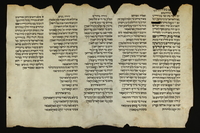
Damaged scroll describing an anti-Jewish pogrom and memorializing those killed
Object
Vellum scroll with an eyewitness account and remembrance of those lost in a 1918 massacre in Novhorod-Siversʹkyi, Russia, (now Ukraine.) Written soon after the pogrom, it curses the perpetrators, recounts the events, and records a prayer for the dead and the names of the men, women, and children who were murdered. It is the only known eyewitness account of this event. On April 6, 1918, as Red Army troops retreated from the German Army, they attacked the Jews of Novhorod-Siversʹkyi, and 88 were killed. Hostility toward Jews was widespread in the Russian Empire, and the military was notoriously antisemitic. Anti-Jewish pogroms, outbreaks of mass violence, erupted frequently in the early 20th century, causing immense suffering. These scrolls were a traditional way to express community remembrance and to honor victims of pogroms. The practice of recording the names of the dead was done following the Holocaust in memorial books known as Yizkor books, created through the collective efforts of survivors to remember and preserve what was lost. The document is one of more than 900 items in the Katz Ehrenthal Collection of antisemitic artifacts and visual materials.
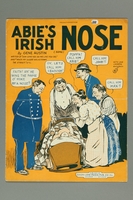
Sheet music
Object
Sheet music for Abie's Irish Nose, a novelty song by Gene Austin (1900-1972) from 1925 based upon the hit Broadway play, Abie's Irish Rose, by Anne Nichols, which opened in 1922. It is about a young couple, an Irish American woman and a Jewish man, who marry despite the objections of their family. The sheet music is one of more than 900 items in the Katz Ehrenthal Collection of antisemitic artifacts and visual materials.
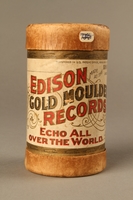
Cylinder recording
Object
Edison wax cylinder recording of the vaudeville song, "When Moshe with his nose leads the band ...." When the sheet music was published, the title was changed to, "When Mose with his nose leads the band ...", presumably to give it wider appeal and make it less offensive. The wax cylinder is one of more than 900 items in the Katz Ehrenthal Collection of antisemitic artifacts and visual materials.
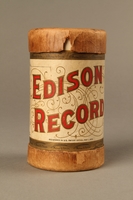
Cylinder recording
Object
Comedy sketch with music, Der Pedler, performed by Sam Silberbusch and Sadie Wachtel. It was recorded on a wax cylinder by Thomas A. Edison's company. The wax cylinder is one of the more than 900 items in the Katz Ehrenthal Collection of antisemitic artifacts and visual materials.

Color print of a bearded saki monkey once called the Jew monkey
Object
The engraving is one of the more than 900 items in the Katz Ehrenthal Collection of antisemitic artifacts and visual materials.
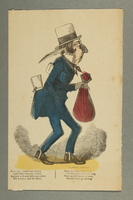
Colored caricature of a Jewish lawyer by A. Park
Object
The engraving is one of the more than 900 items in the Katz Ehrenthal Collection of antisemitic artifacts and visual materials.
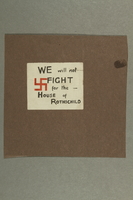
Sticker with Swastika "We will not fight for the house of Rothschild"
Object
The sticker is one of the more than 900 items in the Katz Ehrenthal Collection of antisemitic artifacts and visual materials.
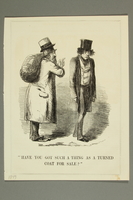
Anti D'Israeli print with a Jewish rag dealer looking to buy a turncoat
Object
The print is one of the more than 900 items in the Katz Ehrenthal Collection of antisemitic artifacts and visual materials.
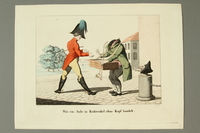
Print of a soldier bargaining with a headless Jewish peddler
Object
Color etching of a soldier encountering a Jewish peddler whose head sits on a nearby post. The caption, Like a Jew in Krahwinkel without a head, refers to the stereotype of the excitable, overreacting Jewish peddler who, when pushed into a corner, looses his head. The fact that he reacts this way when confronted by an authority figure, such as a soldier, supports the antisemitic notion that he has something to hide and has probably done something wrong. The etching is one of the more than 900 items in the Katz Ehrenthal Collection of antisemitic artifacts and visual materials.
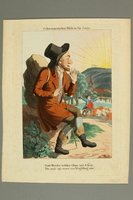
Print of a Jewish peddler admiring the sun
Object
Colored etching, A Rapturous view of the Sun, with a caricature of a Jewish peddler sitting on a rock along the road outside a village, regarding the bright yellow sun above the mountain. The etching is one of the more than 900 items in the Katz Ehrenthal Collection of antisemitic artifacts and visual materials.
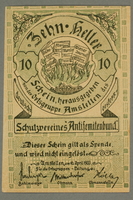
German-Austrian League of Anti-Semites, 10 heller donation receipt
Object
Coupon receipt for a 10 heller donation to the local chapter of the Deutsch-Österreichischer Schutzverein Antisemitenbund [German-Austrian Defensive League of Anti-Semites] in Amstetten, Austria. There were 100 hellers to a krone and the coupons were issued in several denominations with antisemitic quotes from different historical figures. The goal of the Antisemitenbund was to unite all anti-Semites, in order to protect them from the economic, political, and social influence of the Jews. They called for the legal separation of Jews and non-Jews, the expulsion of Jews who arrived after 1914, and wanted to ban Jews from public office, professions, land ownership, and other rights. The League was founded during the financial crisis of 1919, when many politicians, and the public, blamed Jews for the chaos, sparking sometimes violent demonstrations. It grew rapidly, attracting members from all political and social groups. By the 1930s, the group was dominated by Austrian Nazi Party members, while asserting its independence and nonpolitical nature. In March 1938, Germany annexed Austria, and the League was dissolved. The coupon is one of the more than 900 items in the Katz Ehrenthal Collection of antisemitic artifacts and visual materials.
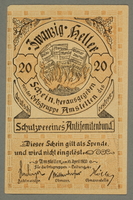
German-Austrian League of Anti-Semites, 20 heller donation receipt
Object
Coupon receipt for a 20 heller donation to the local chapter of the Deutsch-Österreichischer Schutzverein Antisemitenbund [German-Austrian Defensive League of Anti-Semites] in Amstetten, Austria. There were 100 hellers to a krone and the coupons were issued in several denominations with antisemitic quotes from different historical figures. The goal of the Antisemitenbund was to unite all anti-Semites, in order to protect them from the economic, political, and social influence of the Jews. They called for the legal separation of Jews and non-Jews, the expulsion of Jews who arrived after 1914, and wanted to ban Jews from public office, professions, land ownership, and other rights. The League was founded during the financial crisis of 1919, when many politicians, and the public, blamed Jews for the chaos, sparking sometimes violent demonstrations. It grew rapidly, attracting members from all political and social groups. By the 1930s, the group was dominated by Austrian Nazi Party members, while asserting its independence and nonpolitical nature. In March 1938, Germany annexed Austria, and the League was dissolved. The coupon is one of the more than 900 items in the Katz Ehrenthal Collection of antisemitic artifacts and visual materials.

German-Austrian League of Anti-Semites, 50 heller donation receipt
Object
Coupon receipt for a 50 heller donation to the local chapter of the Deutsch-Österreichischer Schutzverein Antisemitenbund [German-Austrian Defensive League of Anti-Semites] in Amstetten, Austria. There were 100 hellers to a krone and the coupons were issued in several denominations with antisemitic quotes from different historical figures. The goal of the Antisemitenbund was to unite all anti-Semites, in order to protect them from the economic, political, and social influence of the Jews. They called for the legal separation of Jews and non-Jews, the expulsion of Jews who arrived after 1914, and wanted to ban Jews from public office, professions, land ownership, and other rights. The League was founded during the financial crisis of 1919, when many politicians, and the public, blamed Jews for the chaos, sparking sometimes violent demonstrations. It grew rapidly, attracting members from all political and social groups. By the 1930s, the group was dominated by Austrian Nazi Party members, while asserting its independence and nonpolitical nature. In March 1938, Germany annexed Austria, and the League was dissolved. The coupon is one of the more than 900 items in the Katz Ehrenthal Collection of antisemitic artifacts and visual materials.
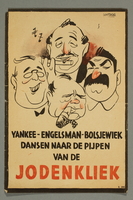
Nazi handbill of Roosevelt, Churchill, and Stalin controlled by Jewish piper
Object
Antisemitic, anti-Allies Nazi propaganda handbill issued in German occupied Netherlands showing the leaders of America, England, and the Soviet Union following the tune of a Jewish man playing a pipe. In May 1940, Germany invaded and occupied the Netherlands, setting up a civil administration supervised by the SS. In June 1941, Germany broke its pact with the Soviet Union and launched an invasion into Russia. On December 7, 1941, Japan attacked Pearl Harbor. Since Germany had a mutual assistance pact with Japan, they declared war against the US four days later. Germany produced war propaganda in the language of the countries they occupied to convince the local populations of the threat posed by the Allies and the need to support the war effort. In this piece, they claim that the Allies are tools of the long standing Jewish conspiracy to dominate the world through their control of international finance. The handbill is one of the more than 900 items in the Katz Ehrenthal Collection of antisemitic artifacts and visual materials.

